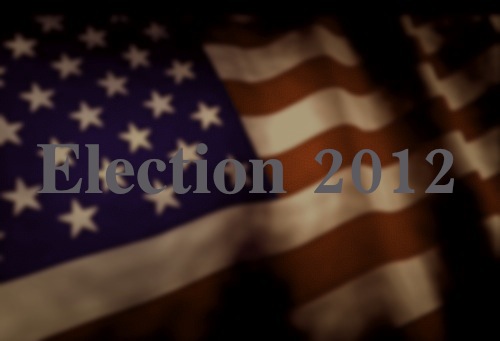| |
FOLLOW
THE
CHRISTIAN
CRUSADE CHARADE |
|
| |
 HE
WHO WOULD DRIVE TO CANADA WITH HIS DOG TIED TO THE ROOF
OF THE CAR
HE
WHO WOULD DRIVE TO CANADA WITH HIS DOG TIED TO THE ROOF
OF THE CAR |
"Yes,
it's down to dog-on-car vs.
man-on-dog.
This is what the GOP has come to."
SteveS, Jersey City ~ Commentator
The New York Times: Feb. 23, 2012
|
|
|
The
Renegade Republicans
By THOMAS B. EDSALL
The New York Times: March 26, 2012
For
nearly three decades, South Carolina served as the bulwark
of the Republican establishment. The state has been the killing
ground of insurgent presidential bids again and again.
The results in South Carolina and in
other states suggest that major segments of the normally compliant
Republican primary electorate have run amok and that the party’s
powerbrokers are no longer able to control the anger and resentment
released by the Tea Party movement, the
mobilization of the Christian right or the realignment
of white working class Southerners.
Romney’s Mormon faith has created a major hurdle to
winning the votes of Southern Baptist and evangelical Christian
voters.
The Jan 21 upheaval in South Carolina was most revealing:
Exit poll data show that the percentage of South Carolina
Republican primary voters identifying
themselves as born-again or evangelical shot up between 2008
and 2012, from 55 to 64 percent.
In an analysis of the contests so far, the Faith
and Freedom Coalition found that evangelicals
are now a majority, 50.53 percent, of all Republican presidential
primary voters. The ascendance of the religious right
has produced “the highest percentage
recorded in a presidential nominating process, 4.29 million
votes out of 8.49 million cast,” according to
the coalition.
This represents a significant increase from 2008, when 44
percent of Republican turnout was made up of evangelical Christians.
According to Ralph Reed, founder of
the Faith and Freedom Coalition:
| Conservative
people of faith are playing a larger role in shaping the
contours and affecting the trajectory of the Republican
presidential nomination contest than at any time since
they began pouring out of the pews and into the precincts
in the late 1970s. |
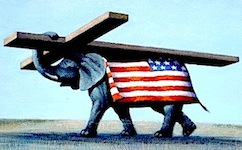 A
plurality of Christian evangelical voters, 32.85 percent,
has backed Santorum, while Romney is second with 29.74,
a tiny fraction ahead of Newt Gingrich, 29.65. A
plurality of Christian evangelical voters, 32.85 percent,
has backed Santorum, while Romney is second with 29.74,
a tiny fraction ahead of Newt Gingrich, 29.65.
These trends, while not predictive of
the outcome in November, are problematic for the Republican
Party. As the general public becomes more tolerant
on issues like gay rights and premarital sex, it
is moving farther and farther from the cultural and moral
agenda of the religious right.
|

TIMOTHY
EGAN
|
The Church Lady
State
By TIMOTHY EGAN
The New York Times: March 22, 2012
When
people complain about liberal overreach they always bring
up the nanny state. You know,
sorting your garbage to see if a banana peel slipped in with
a cellophane wrapper; energy-efficient light bulbs; neutered
language in the public square to make  sure
no one is ever offended. sure
no one is ever offended.
But all of the above is a mere teardrop
in the Amazon compared to what your freedom-hating Republican
Party has been doing across the land to restrict individual
liberty.
They want the state to follow you into
the bedroom, the bathroom and beyond. They think you’re
too stupid to know what to do with your own body, too ignorant
to understand what your doctors tell you and too lazy to be
trusted in a job without being subject to random drug testing.
Your body is the government’s
business.
Let’s take a tour of the Church
Lady (right) state to date. Our nation may soon turn
its lonely eyes to Idaho, where
Gov. Butch Otter could have the
final say on a bill that would order women to undergo a medically
unnecessary and invasive procedure before deciding to end
a pregnancy.
Idaho politicians love to go on and
on about how government shouldn’t force people to do
things that violate their conscience, or common sense. And
for the last three years, we’ve heard Republican presidential
candidates condemn the abomination of government coming between
you and your doctor.
But given a chance to govern without a sanity filter, these
same Republicans
become Big Brother in a surgical smock.
In Idaho, almost one in five
people have no health insurance. Except
now the Republican Legislature
wants to force you to undergo at least one medical procedure,
no matter whether you have health care.
Compounding the lunacy of this reach into your family discussions,
the bill’s main sponsor, State
Senator Chuck Winder, suggested that rape victims seeking
exceptions might be lying about how they got pregnant.
He said women should ask their doctors
if their pregnancy was caused by rape or “normal relations
in a marriage.” And, yes, I hate to say it, but
politicians are that stupid and that mean-spirited in Idaho.
Here’s a leader of the State Legislature
suggesting that a woman is just too dumb to know whether she
was raped or not.
In Texas, Carolyn Jones just
went through the punitive end of a horrid law prompted by
militant sanctimony. She is a working mother, married, who
was anticipating the birth of her second child when she
was told of deformities in the fetus. After agonizing, she
felt she had no choice but to end the pregnancy. That was
the start of her special hell in the Lone Star State.
When she went to an agency that performed abortions, she was
told that she must have a sonogram, per the new law, in order
to shame her into hearing a heartbeat. “I
didn’t want another sonogram when I’d already
had two today,” she wrote, in a gripping account
in the Texas Observer. “Here was a superfluous layer
of torment piled upon an already horrific day.”
Good people can argue the morality of early-stage abortion.
But as long as abortion
is legal, no woman should have to face Big Government’s
medical wand — or gloved fist —
for no other reason than some male politicians want to make
you feel bad.
| Did
you see the banner behind Rick Santorum’s defeat
rally on 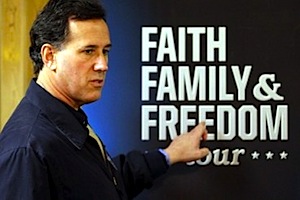 Tuesday?
One word: FREEDOM. Tuesday?
One word: FREEDOM.
But
just a few days earlier, Santorum
applauded a preacher in Louisiana who said people who
didn’t want to live in a Christian nation should
leave the country. Freedom, in Santorum’s
world, apparently only applies only to those of one
religion.
Mitt Romney has been decrying
the Obama administration’s
“assault on freedom.” But those
who seem to “hate our freedom” —
as George W. Bush called theocrats of another stripe
— are the pilgrims with
pitchforks in Romney’s own party.
There is one recent exception,
and it deserves praise. A few days ago, the
New Hampshire Legislature voted overwhelmingly
to keep a law that gives people of the same sex the
freedom to marry. Legislators
decided, in the kind of deliberation that stills
the cynic in me, that telling
somebody whom they can or cannot marry is the ultimate
restriction on personal liberty. |

Independent
Man atop the NH State capitol
|
If
your official state motto is “Live
Free or Die,” you ought to act like you believe
it.
They
did.
|
|
Divided
on the Right
EDITORIAL
Th
e New York Times: March 14, 2012
Most
public opinion polls show that Mr. Romney would have the best
chance against President Obama in November, but that doesn’t
seem to matter to the party’s zealots. In Alabama
and Mississippi, fewer than 40
percent of the primary voters on Tuesday said defeating Mr.
Obama was the most important quality in a candidate. Many
people who voted for Mr. Santorum or Newt Gingrich said Mr.
Romney had a better chance of winning.
What was important to them? More than
70 percent of voters in the two states said it was important
that a candidate shared their religious beliefs. Mr.
Santorum won with the votes of those who said it was most
important that their candidate be a true conservative, or
have a strong moral character. Those numbers suggest that
many Republicans would rather drive
into a political ditch than temper their extreme ideology
to defeat Mr. Obama.
Published
Commentary
 @
Tim B, Seattle @
Tim B, Seattle
"...what
happens if a candidate
who has deeply conservative religious beliefs is elected
President, and then he or she attempts to get those
beliefs into the national dialogue and ultimately
into the laws which govern us?"
That is exactly what is happening as we watch and
ruminate. It's called a Theocracy. You know, like
Iran, Saudi Arabia or Vatican City. It's beyond disturbing.
It's downright frightening.
"The United States is not a Christian nation
any more than it is a Jewish or a Mohammedan nation."
~ JOHN ADAMS
ROBERT COANE, March 15, 2012
|
|
|
Don’t
Tread on Us
By MAUREEN DOWD, OP-ED COLUMNIST
The New York Times: March 13, 2012
The
Republican assault on women does, though, provide a glide path
to the White House both for Obama in 2012 and Hillary in 2016.
Women have watched a chilling cascade of efforts in Congress
and a succession of states to turn women into chattel, to shame
them about sex and curb their reproductive rights. They’ve
seen the craven response of G.O.P. candidates after Limbaugh
branded a law student wanting insurance coverage for birth control
pills, commonplace for almost five decades, as a “prostitute”
and “slut.”
American women have suddenly realized that their emancipation
in the 21st century is not as secure as they had assumed. On
“Meet the Press” on Sunday, Gov.
Bob McDonnell of Virginia, a Republican, had the gall
to say this, justifying his support for a bill designed to humiliate
women getting abortions by penetrating them with a wand to take
a picture: “Every invasive procedure
has an informed consent requirement.” What he really
meant is that when abortion is an option,
informed consent should require an invasive procedure.
Along with Rick Santorum’s Taliban
views, Mitt Romney suggested in an interview on Tuesday with
a St. Louis TV station that to help balance the federal budget
he would eliminate Planned Parenthood funding: “We’re
going to get rid of that.” |
| |
Ignorance
Is Strength
By PAUL KRUGMAN, OP-ED COLUMNIST
The New York Times: March 8, 2012
One
way in which Americans have always been exceptional has been
in our support for education. First we took the lead in universal
primary education; then the “high school movement”
made us the first nation to embrace widespread secondary education.
And after World War II, public support, including the G.I.
Bill and a huge expansion of public universities, helped large
numbers of Americans to get college degrees.
But now one of our two major political parties has taken a
hard right turn against education, or at least against education
that working Americans can afford. Remarkably, this new hostility
to education is shared by the social conservative and economic
conservative wings of the Republican coalition, now embodied
in the persons of Rick Santorum
and Mitt Romney.
And this comes at a time when American
education is already in deep trouble.

About that hostility: Mr. Santorum
made headlines by declaring that President Obama wants to
expand college enrollment because colleges
are “indoctrination mills” that destroy religious
faith.
It’s not hard to see what’s driving Mr. Santorum’s
wing of the party. His specific claim that college attendance
undermines faith is, it turns out, false. But
he’s right to feel that our higher education system
isn’t friendly ground for current conservative ideology.
And it’s not just liberal-arts
professors: among scientists,
self-identified Democrats outnumber self-identified Republicans
nine to one.
I guess Mr. Santorum would see this as evidence of a liberal
conspiracy. Others might suggest that
scientists find it hard to support a party in which denial
of climate change has become a political litmus test, and
denial of the theory of evolution is well on its way to similar
status.
Published
Commentary
Ignorance Is
Strength
March 8, 2012
When "Republicans say that they are the
party of  traditional
values," American values, bear in mind that a
huge swath of America [I would dare say a majority]
has historically been anti-intelectual and anti-science,
suspicious and fearful of change and progress, from
the Pilgrim Fathers through the Scopes trial to Rick
Santorum's pronouncements and condemnations, "
universal primary education....widespread secondary
education...the G.I. Bill and a huge expansion of
public universities" after WWII notwithstanding. traditional
values," American values, bear in mind that a
huge swath of America [I would dare say a majority]
has historically been anti-intelectual and anti-science,
suspicious and fearful of change and progress, from
the Pilgrim Fathers through the Scopes trial to Rick
Santorum's pronouncements and condemnations, "
universal primary education....widespread secondary
education...the G.I. Bill and a huge expansion of
public universities" after WWII notwithstanding.
It should come as no surprise that Santorums and Romneys
seek advantage in pandering precisely to those prevalent
prejudices. H.L. Mencken observed almost a century
ago that “the whole aim of practical politics
is to keep the populace alarmed (and hence clamorous
to be led to safety) by menacing it with an endless
series of hobgoblins, all of them imaginary.”
The warming deniers, anti-evolutionists and religious
dogmatics are doing well ... and Ignorance IS bliss.
Encourage it.
ROBERT
COANE, March 9, 2012
|
|

CHARLES
M. BLOW
|
Santorum
and the Sexual Revolution
By CHARLES M. BLOW,
OP-ED
COLUMNIST
The New York Times: March 2, 2012
[At]a
speech and question-and-answer session [Santorum] gave in 2008
to a course on religion and politics at the Oxford
Center for Religion and Public Life in Washington ...
in response to a question about the kinds of words he had heard
“attached to religion and politics” during his years
in the Senate, Santorum ventured off onto sex:
“It comes down to sex. That’s
what it’s all about. It comes down to freedom, and it
comes down to sex. If you have anything to do with any of the
sexual issues, and if you are on the wrong side of being able
to do all of the sexual freedoms you want, you are a bad guy.
And you’re dangerous because you are going to limit my
freedom in an area that’s the most central to me. And
that’s the way it’s looked at.”
 “Woodstock
is the great American orgy. This is who the Democratic
Party has become. They have become the party of Woodstock. They
prey upon our most basic primal “Woodstock
is the great American orgy. This is who the Democratic
Party has become. They have become the party of Woodstock. They
prey upon our most basic primal  lusts,
and that’s sex. And the whole abortion culture, it’s
not about life. It’s about sexual freedom. That’s
what it’s about. Homosexuality. It’s about sexual
freedom. All of the things are about sexual freedom, and they
hate to be called on them. They try to somehow or other tie
this to the founding fathers’ vision of liberty, which
is bizarre. It’s ridiculous. That’s at the core
of why you are attacked.” lusts,
and that’s sex. And the whole abortion culture, it’s
not about life. It’s about sexual freedom. That’s
what it’s about. Homosexuality. It’s about sexual
freedom. All of the things are about sexual freedom, and they
hate to be called on them. They try to somehow or other tie
this to the founding fathers’ vision of liberty, which
is bizarre. It’s ridiculous. That’s at the core
of why you are attacked.”
The next question was: “Do you see any possibility for
a party of Christian reform, or an influx of Christian ideas
into this [Democratic] party?”
Santorum’s answer included what? That’s right: Sex!
While explaining what he saw as a shift in the Democratic Party
away from “blue-collar working-class folks with traditional
values” Santorum said:
“What changed was the ’60s.
What changed was sex. What changed was the social and cultural
issues that have huge amounts of money because if you look —
I haven’t seen numbers on this, but I’m sure it’s
true — if you go socioeconomic scale, the higher the income,
the more socially liberal you are. The more you know you can
buy your way out of the problems that sexual libertinism causes
you. You have an abortion, well, I have the money to take care
of it. If I want to live an extravagant life and get diseases,
I can. ... You can always take care of everything. If you have
money, you can get away with things that if you’re poor
you can’t.”
The questions finally got around to asking about sex directly,
much to Santorum’s 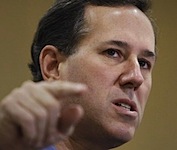  delight,
I’m sure. To one of those questions Santorum answered
in part: delight,
I’m sure. To one of those questions Santorum answered
in part:
“Sex is a means. Evolution
is a means. And the aim is a secular world. It’s a, in
my opinion, a hedonistic, self-focused world that is, in my
opinion, anti-American.”
Santorum may now cloak his current views in Catholic fundamentalism
and Constitutional literalism, but, at their root, they are
his reaction to, and revulsion for, the social-sexual liberation
that began in the 1960s.
Santorum’s stances are not about our Constitution, but
his. He views personal freedoms as a personal affront. His thinking
exists in a pre-1960s era of aspirin-between-the-knees contraception
and read-between-the-lines sexuality.
The kind of conservatism that
Santorum represents has been described as a war on women, but
I would rephrase that. It’s a war on sex beyond the confines
of traditional marriage and strict heterosexuality in which
women, particularly poor ones, and gays, particularly open ones,
are likely to suffer the greatest casualties. |

FRANK BRUNI |
It’s
a College, Not a Cloister
By FRANK BRUNI, OP-ED COLUMNIST
The New York Times: February 27, 2012
Most
of that attention has focused on his complaint that President
Obama’s stated goal of making higher education accessible
to all is a snobby one that assumes academic   inclinations
where they may not exist. But Santorum
has also decried universities
as enemies of faith, environments
that leach
some of the unquestioned piety out of young adults who are,
in this new setting, being prodded to
ask questions. He went so far as to call colleges “indoctrination
mills” that ridicule and isolate young conservatives. inclinations
where they may not exist. But Santorum
has also decried universities
as enemies of faith, environments
that leach
some of the unquestioned piety out of young adults who are,
in this new setting, being prodded to
ask questions. He went so far as to call colleges “indoctrination
mills” that ridicule and isolate young conservatives.
If you couple the selectiveness and
stridency of Santorum’s lament about college with his
and his wife’s decision to home-school all seven of
their children, you have to wonder if his real beef
with higher education is that it threatens
the indoctrination that has sometimes occurred already around
the kitchen table. It does what
it’s supposed to do, encouraging young adults to survey
a broader field of perspectives, exhorting them to tap into
a deeper well of information, inviting them to draw their
own conclusions, and allowing them to figure out for themselves
what they believe and who they are.
About 1.5 million American children
were home-schooled in 2007, the latest year for which the
Department of Education provides an estimate. When their
parents were asked why, they most commonly cited moral and
spiritual reasons. ...they’re
not so much impressing as radically
imposing their values on their offspring by cutting them off
from alternative viewpoints.

[Santorum’s] qualms aren’t just with college today.
They’re with the true purpose and importance of education.
Published
Commentary
@
poslug
cambridge, ma
February 28, 2012
"Whatever happened to faith that is not questioned
and examined is not faith."

Faith
that IS questioned and examined
is lost. ROBERT
COANE, Feb. 28, 2012
|
|
| |
Santorum
Makes Case for Religion in Public Sphere
By MICHAEL BARBARO
The New York Times: February 26, 2012
TRAVERSE
CITY, Mich. — With two days left before the high-stakes
Republican primaries in Arizona and Michigan, Rick Santorum
delivered a full-throated defense of religion in public life
on Sunday, appealing to the social conservatives who have
revived his presidential campaign.
In an escalation of the sometimes fiery language that he has
used throughout the race, Mr. Santorum
declared that colleges were no longer a “neutral setting”
for people of faith and described how he had become sickened
after reading John F. Kennedy’s 1960 speech calling
for the rigid separation of religion and politics.
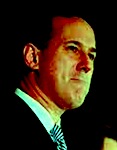

“What kind of country do we live
in that says only people of nonfaith can come into the public
square and make their case?” Mr. Santorum said
on the ABC News program “This
Week.”
“That
makes me throw up,” he said, adding
later, “I don’t believe
in an America where the separation of church and state is
absolute.”
|

DAVID FIRESTONE
|
Rick
Santorum and the Politics of Theology
By DAVID FIRESTONE
The New York Times: February 20, 2012
Rick
Santorum
talks about the economy periodically –
reciting the tired Republican manifesto that cutting taxes and
spending will solve all economic problems – but
his campaign has distinguished itself
from the others more for its sense of religious supremacy.
More than any major candidate in recent
times, Mr. Santorum has derogated the federal government on
religious grounds. On issue after issue, from education to the
environment to health care, he has not only disagreed with decades
of federal policy, but has accused those who implement it of
a conscious and deliberate effort to destroy the foundations
of faith.
After weeks of railing about the Obama administration’s
mandate for free birth control as religious
oppression, he upped the ante on Saturday and said the same
thing about pre-natal testing, which has saved the lives
of countless mothers and babies. For Mr.
Santorum, of course, it’s all about abortion, limiting
the rights of women, and the possibility that parents will abort
a fetus if they discover a grave birth defect. But health
experts know that testing can make a huge difference in safe
deliveries and healthy infants.
To cite just one example, a test for sexually
transmitted diseases in pregnant women can allow doctors to
treat a fetus for syphilis in the womb before it is born. Many
states require such tests, and the reasons the Obama administration
has required insurance policies to cover it for free are almost
too obvious to state.
But for Mr. Santorum it is just another example of what he dared
to describe as Mr. Obama’s “phony
theology.”
“It’s about some phony ideal,
some phony theology,” he said in Ohio, referring
to what he called the president’s imposition of his ideas
on churches. “Oh, not a theology
based on the Bible, a different theology. But no less a theology.”
Because Mr. Obama cares about public health, like most presidents
and governors and mayors and lawmakers, he builds his public
policy on the recommendations of scientists and medical experts.
That infuriates those, like Mr. Santorum, who say that
divine law should come first.
But in fact, that’s not how this country works. Presidential
administrations are not 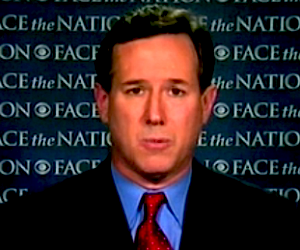 supposed
to have theologies. Individuals are free to do so, but
the Constitution and the Supreme Court
have been explicit over the years that religious doctrine cannot
supersede secular law. That may seem obvious, but there
are many people who have never accepted it. supposed
to have theologies. Individuals are free to do so, but
the Constitution and the Supreme Court
have been explicit over the years that religious doctrine cannot
supersede secular law. That may seem obvious, but there
are many people who have never accepted it.
Mr. Santorum, who is one of them, has apparently picked
up enough likeminded votes to enjoy a moment at the top of the
Republican field with this kind of thinking. Much of it deliberately
plays to those who believe that Mr. Obama
is neither a Christian nor an American. “I
believe the president is a Christian,” Mr. Santorum
said on Sunday on Face the Nation,
but of course immediately added: “He
says he’s
a Christian.”
But that apparently isn’t good enough. In Mr. Santorum’s
eyes, unless you adopt his particularly Christian theology,
you can’t be his kind of president.
FULL
TEXT |
|
Santorum
attacks Obama on prenatal screening
By Rebecca Kaplan
February 18, 2012
COLUMBUS,
Ohio - Campaigning in Ohio on Saturday, Rick Santorum displayed
his 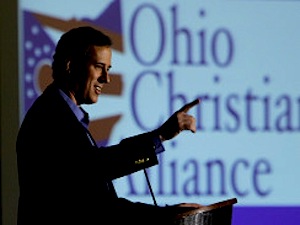 culture-warrior
side in full force, as
he harshly attacked President Obama by suggesting
the president wanted to see more disabled babies aborted and
accusing him of projecting his values - which Santorum claimed
were not rooted in the Bible - on the Catholic Church. culture-warrior
side in full force, as
he harshly attacked President Obama by suggesting
the president wanted to see more disabled babies aborted and
accusing him of projecting his values - which Santorum claimed
were not rooted in the Bible - on the Catholic Church.
Santorum recalled his prominent role in the 1990s debates over
the controversial procedure that critics call partial-birth
abortion. He lambasted the  president's
health care law requiring insurance policies to include free
prenatal testing, "because free prenatal
testing ends up in more abortions and therefore less care that
has to be done because we cull the ranks of the disabled in
our society." president's
health care law requiring insurance policies to include free
prenatal testing, "because free prenatal
testing ends up in more abortions and therefore less care that
has to be done because we cull the ranks of the disabled in
our society."
"That, too, is part of Obamacare, another hidden message
as to what President Obama thinks of those who are less able
than the elites who want to govern our country,"
Santorum said.
Prenatal tests are a standard part of
modern medical care. The Department of Health and Human Services
says such tests "help keep you and your baby healthy during
pregnancy. It also involves education and counseling about how
to handle different aspects of your pregnancy."
After devoting much of his speech to the health care law, an
occasionally testy Santorum found himself the subject of reporters'
regarding his socially conservative stances.
Earlier in the day, the former Pennsylvania senator charged
that Obama's agenda is "not about you ... It's about some
phony ideal. Some phony theology. Not a theology based on the
Bible." That prompted Obama
campaign spokesman Ben LaBolt to call Santorum's comment "the
latest low in a Republican primary campaign that has been fueled
by distortions, ugliness and searing pessimism and negativity."
LaBolt said it was "a stark contrast with the President
who is focused every day on creating jobs and restoring economic
security for the middle class."
But Santorum doubled down on his attacks, accusing the president
of forcing a new moral code on the Catholic
church.
"The president has reached a new
low in this country's history of oppressing religious freedom
that we have never seen before," he said. "If
he doesn't want to call his imposition of his values a theology,
that's fine, but it is an imposition of his values over a church
who has very clear theological reasons for opposing what the
Obama administration is forcing on them."
Asked about the fact that the president is a Christian, Santorum
answered: "He says he's a Christian, he's a Christian,"
and would not elaborate on how to balance competing ideas about
contraception within the broader faith.
But he was firm in painting the president as promulgating a
"new moral code" that he contended was "intolerant"
of the church.
Santorum's high-profile role on such issues
ensures that questions about his social positions will follow
him across the country and through a general election campaign,
should he win the nomination. Despite the firestorm they ignite
at times - and the fact that it can produce lower poll numbers
among women voters - the former Pennsylvania senator said he
doesn't intend to let up.
"You ask a lot of questions about
the social issues," he accused a reporter who asked if
he would speak out on those issues during a general election
race. "I'm going to talk about the things that I think
are important to this country. I've done so throughout the course
of this campaign, and I'll continue to do so."
(Full
text) |
|
For
God So Loved the 1 Percent …
By KEVIN M. KRUSE
The New York Times: January 17, 2012
Princeton,
N.J. - IN recent weeks Mitt Romney has become the poster child
for unchecked capitalism, a role he seems to embrace with relish.
Concerns about economic
equality, he told Matt Lauer of
NBC, were really about class warfare.
“When you have a president encouraging
the idea of dividing America based on the 99 percent versus
1 percent,” he said, “you
have opened up a whole new wave of approach 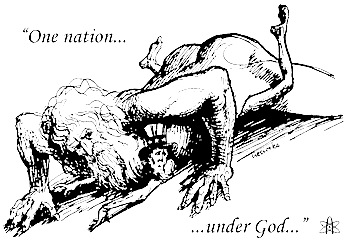 in
this country which is entirely inconsistent with the concept
of one
nation under God.” in
this country which is entirely inconsistent with the concept
of one
nation under God.”
Mr. Romney was on to something, though
perhaps not what he intended.
 The concept of “one nation under
God” has a noble lineage, originating in Abraham
Lincoln’s hope at Gettysburg that “this
nation, under God, shall not perish from the earth.”
After Lincoln, however, the phrase disappeared
from political discourse for decades. But it re-emerged
in the mid-20th century, under a much different guise: corporate
leaders and conservative clergymen deployed it to discredit
Franklin D. Roosevelt’s New Deal.
The concept of “one nation under
God” has a noble lineage, originating in Abraham
Lincoln’s hope at Gettysburg that “this
nation, under God, shall not perish from the earth.”
After Lincoln, however, the phrase disappeared
from political discourse for decades. But it re-emerged
in the mid-20th century, under a much different guise: corporate
leaders and conservative clergymen deployed it to discredit
Franklin D. Roosevelt’s New Deal.
During the Great
Depression, the prestige of big
business sank along with stock  prices.
Corporate leaders worked frantically to restore their
public image and simultaneously roll back the “creeping
socialism” of the welfare state. Notably, the American
Liberty League, financed by corporations like DuPont and General
Motors, made an aggressive case for capitalism. prices.
Corporate leaders worked frantically to restore their
public image and simultaneously roll back the “creeping
socialism” of the welfare state. Notably, the American
Liberty League, financed by corporations like DuPont and General
Motors, made an aggressive case for capitalism.
A
Democratic Party official joked
that the organization should have been called “the
American Cellophane League” because “first,
it’s a DuPont product and, second, you can see right through
it.” |
|
Rick
Perry compares himself to Moses
By Rebecca Kaplan
CBS News:January 15, 2012
MYRTLE
BEACH, S.C. - Rick Perry's no stranger to gaffes, but he has
tried to turn it into an asset, making self-deprecating jokes
about it on the campaign trail.
On Sunday, he found an ally in speech challenges that drew
laughs from the audience of the South
Carolina Faith and Freedom Coalition prayer breakfast:
Moses.
"Moses, he tried to talk god out
of making him go lead the people," Perry told the crowd
of about 300. "He wasn't a good speaker. Now, from time
to time I can relate to that."
Perry's speech, which got a standing
ovation from the crowd, urged the members in the audience
to vote their values and reject the media narrative about
which candidate was best prepared to beat President Obama
(a thinly veiled reference to front-runner Mitt Romney.
"I ask you to think about the kind of leader you want
to preside over our nation," he said. "Who will
be faithful to your values? Who will see the job of the president
as that of a faithful servant of the American people and to
the God that created us?"
Perry has reiterated the vote-your-values
message on the stump as he seeks to establish himself as the
conservative alternative to Mitt Romney. So far, though, polls
show him in the single digits.
(Full
text)
|
| |
Is
America ready for a Mormon President?
By Phil Hirschkorn
CBS News: January 14, 2012
COLUMBIA,
S.C. - Mitt Romney faced down the question of whether America
is ready for a Mormon President on Friday night in Hilton Head,
South Carolina. During a town meeting, supporter Betty
Treen took the microphone to ask the former Massachusetts
Governor point blank about his faith.
"I am for you, but I need to ask
you a personal question: Do you believe in the divine   saving
grace of Jesus Christ?" A
murmur could be heard in the crowd in the few seconds it took
Romney to get the microphone back. saving
grace of Jesus Christ?" A
murmur could be heard in the crowd in the few seconds it took
Romney to get the microphone back.
"Yes, I do," Romney began,
as the crowd erupted into applause led
by home state governor Nikki Haley,
who was on stage with the candidate she has endorsed.
"I would note there are people in
our nation that have different beliefs; there are  people
of the Jewish faith, and people of the Islamic faith, and other
faiths who believe other things, and our President will be President
of the people of all faiths," Romney said, again
interrupted by applause. people
of the Jewish faith, and people of the Islamic faith, and other
faiths who believe other things, and our President will be President
of the people of all faiths," Romney said, again
interrupted by applause.
Then, finally, Romney got to the take away.
"Our nation was founded on the principle
in some respects, of religious tolerance and liberty in this
land, and so we welcome people of other faiths, and I happen
to believe Jesus Christ is the son of God and my Savior."
"I know other people have differing views, and I respect
those views and don't believe those qualify or disqualify people
for leadership in our nation," Romney said.
The shadow over Romney's candidacy is
whether white evangelical voters, who made up 55 percent of
South Carolina Republican primary voters in 2008, would effectively
disqualify Romney in this pivotal primary state.
Sixty percent of Republican primary voters nationwide told CBS
NEWS this week that it is important for
a presidential candidate to share their religious views.
To white evangelicals, it is even more
important -- 85 percent said shared faith was important.
Brad Atkins, President of South Carolina's
Baptist Convention, said the voters'
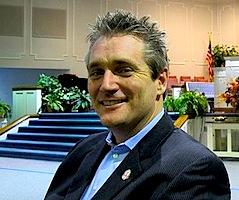 grounding
in faith is no surprise for the Palmetto State. grounding
in faith is no surprise for the Palmetto State.
"When we look at a candidate, we
cannot just take their spiritual aspect of their life and disconnect
it from their political aspect. If you look in the word of God,
it says that 'A man thinks in his heart, so he is,' which means
the core beliefs that candidate has ultimately is going to dictate
the way he implements policy."
With 600,000 parishioners, Baptists are
the state's largest Christian denomination. Atkins, an active
minister himself, does not embrace Mormons as fellow Christians.
"To me, it's just a different group
of people, a different group of faith. Just like Islam is a
different group of people, a different group of faith,"
he said.
In fact, while 97 percent of
Mormons consider themselves Christians, only 51 percent of Christians
consider Mormons to be Christians, according
the Pew Forum on Religion and Public Life. |
|
The
Theological Differences Behind Evangelical Unease With Romney
By LAURIE GOODSTEIN
The New York Times: January 14, 2012
The
Rev. R. Philip Roberts, the president of a Southern Baptist
seminary in Kansas City, Mo., is an evangelist with a particular
goal: countering Mormon beliefs.
Mr. Roberts has traveled throughout the United States, and to
some countries abroad, preaching that Mormonism is heretical
to Christianity. His message is a theological one, but theology
is about to land squarely in the middle of the Republican presidential
primary campaign.
As the Republican voting moves South,
with primaries in South Carolina on Saturday and in Florida
on Jan. 31, the religion of Mitt Romney, the front-runner, may
be an inescapable issue in many voters’ minds. In
South Carolina, where about 60 percent
of Republican voters are evangelical Christians, Mr. Romney,
a devout Mormon and a former bishop in the church, faces
an electorate that has been exposed over the years to preachers
like Mr. Roberts who teach that the Mormon
faith is apostasy.
Many evangelicals have numerous reasons,
other than religion, for objecting to Mr. Romney. But to understand
just how hard it is for some to coalesce around his candidacy,
it is important to understand the gravity of their theological
qualms.
“I don’t have any concerns
about Mitt Romney using his position as either a candidate or
as president of the United States to push Mormonism,”
said Mr. Roberts, an author of
“Mormonism Unmasked” and
president of the Midwestern Baptist Theological Seminary, who
said he had no plans to travel to South Carolina before the
voting. “The concern among evangelicals
is that the Mormon Church will use his position around the world
as a calling card for legitimizing their church and proselytizing
people.”
Mormons consider themselves Christians — as denoted in
the church’s name, the Church of Jesus Christ of Latter-day
Saints. Yet the theological differences
between Mormonism and traditional Christianity are so fundamental,
experts in both say, that they encompass
the very understanding of God and Jesus, what counts as Scripture
and what happens when people die.
“Mormonism is a distinctive religion,”
David Campbell, a Mormon and an associate professor of
political science at the University of Notre Dame who specializes
in religion and politics. “It’s not the same as
Presbyterianism or Methodism. But at the
same time, there have been efforts on the part of the church
to emphasize the commonality with other Christian faiths, and
that’s a tricky balance to strike for the church.”
On the most fundamental issue, traditional Christians
believe in the Trinity: that God
is the Father, the Son and the Holy Spirit all rolled into one.
Mormons reject this as a non-biblical
creed that emerged in the fourth and fifth centuries.
They believe that God the Father and Jesus
are separate physical beings, and that God has a wife whom they
call Heavenly Mother.
It is not only evangelical Christians
who object to these ideas.
“That’s just not Christian,” said the
Rev. Serene Jones, president of
Union Theological Seminary, a liberal Protestant seminary in
New York City. “God and Jesus are
not separate physical beings. That would be anathema. At the
end of the day, all the other stuff doesn’t matter except
the divinity of Jesus.”
The Mormon Church says that in the early 1800s, its first prophet,
Joseph Smith, had revelations that
restored Christianity to its true path, a course correction
necessary because previous Christian churches had corrupted
the faith. Smith bequeathed to his church volumes of revelations
contained in scripture used only by Mormons: “The
Book of Mormon: Another Testament of Jesus Christ,” “The
Doctrine and Covenants” and “Pearl of Great Price.”
Traditional Christians do not recognize any of those as Scripture.
Another big sticking point concerns the
afterlife. Early Mormon apostles gave talks asserting that human
beings would become like gods and inherit their own planets
— language now regularly
held up to ridicule by critics of Mormonism.
But Kathleen Flake, a Mormon who is a professor of American
religious history at Vanderbilt Divinity School, explained that
the planets notion had been de-emphasized in modern times in
favor of a less concrete explanation: people who die embark
on an “eternal progression” that allows them “to
partake in God’s glory.”
“Mormons think of God as a parent,” she said. “God
makes the world in order to give that world to his children.
It’s like sending your child to Harvard — God gives
his children every possible opportunity to progress towards
this higher life that God possesses. When Mormons say ‘Heavenly
Father,’ they mean it. It’s not a metaphor.”
It is the blurring of the lines between God, Jesus and human
beings that is hard for evangelicals to swallow, said Richard
J. Mouw, president of Fuller Theological Seminary, an evangelical
school in Pasadena, Calif., who has been involved in a dialogue
group between evangelicals and Mormons for 12 years and has
a deep understanding of theology as Mormons see it.
“Both Christians and Jews, on the basis of our common
Scriptures, we’d all agree that God is God and we are
not,” Mr. Mouw said. “There’s a huge ontological
gap between the Creator and the creature. So any religious perspective
that reduces that gap, you think, oh, wow, that could never
be called Christian.”
Mormons tend to explain the doctrinal differences more gently.
Lane Williams, a Mormon and a professor of communications at
Brigham Young University-Idaho, a Mormon institution, said the
way he understands it, “it’s not a ‘we’re
right and they’re wrong’ kind of approach. But it’s
as though we feel we have a broader circle of truth.
“My daily life tries to be about Jesus Christ,”
he said. “And in that way, I don’t think I’m
much different from my Protestant friends.”
In a Pew poll released in late November, about two-thirds of
mainline Protestants and Catholics said Mormonism is Christian,
compared with only about a third of white evangelicals. By contrast,
97 percent of Mormons said their religion is Christian in a
different Pew poll released this month.
Mr. Mouw said that only a month ago he was called to Salt Lake
City to mediate a theological discussion about Mormonism among
four evangelical leaders who had collaborated with Mormon leaders
to pass the Proposition 8 ban on same-sex marriage in California.
After two and a half days of discussions, the group was divided
on Mormon theology, Mr. Mouw said.
“Two concluded that while Mormons are good people, they
don’t worship the same God,” Mr. Mouw said. “Two
concluded that Mormons love Jesus just as the evangelicals do,
and they accepted the Mormons as brothers and sisters in Christ.
“That’s the split,” Mr. Mouw said, “and
it’s very basic.”
(Full
text) |
| |
What’s
Race Got to Do With It?
By LEE SIEGEL
The New York Times: January 14, 2012
Mr.
Romney’s Mormonism may end up being a critical advantage.
Evangelicals might wring their hands over the prospect of
a Mormon president, but
there is no stronger bastion 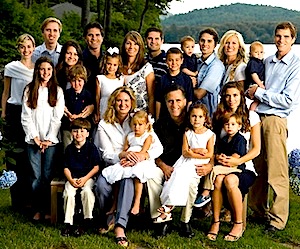 of
pre-civil-rights-America whiteness than the Church of Jesus
Christ of Latter-day Saints. of
pre-civil-rights-America whiteness than the Church of Jesus
Christ of Latter-day Saints.
Yes, since 1978 the church has allowed
blacks to become priests. But Mormonism is still imagined
by its adherents as a religion founded
by whites, for whites, rooted in a millenarian vision of an
America destined to fulfill a white God’s plans for
earth.
...while Mr. Romney may, in some people’s eyes, be a
non-Christian, he is better than
any of his opponents at synching his worldview with that of
the evangelicals. He likes to present,
with theological urgency, a stark choice between, in his words,
President Obama’s “entitlement society”
and the true American freedom of an “opportunity society.”
By the time he intones the Puritans’
alabaster ideal of America as a “shining
city on a hill,” you wonder if he is not also
asking us to choose between two different types of mountaintops.
In this way, whether he means to or not, Mr. Romney connects
with a central evangelic fantasy: that
the Barack Obama years, far from being the way forward, are
in fact a historical aberration, a tear in the white space-time
continuum. And let’s be clear: Mr. Obama’s election
was not destiny, but a fluke.
As
became immediately apparent in 2009, millions of Americans
were unwilling to accept  the
basic democratic premise that Mr. Obama legally and morally
deserved to sit in the White House — and that was before
they confronted his “socialist” and “un-American”
policy agenda. the
basic democratic premise that Mr. Obama legally and morally
deserved to sit in the White House — and that was before
they confronted his “socialist” and “un-American”
policy agenda.
Mitt Romney knows this. He
knows that he offers to these people the white solution to
the problem of a black president. I
am sure that Mr. Romney is not a racist. But I am also sure
that, for the many Americans who find the thought of
a black president unbearable, he is
an ideal candidate. For these sudden outsiders, Mitt
Romney is the conventional man with the outsider faith —
an apocalyptic pragmatist — who will wrest the country
back from the unconventional man with the intolerable outsider
color.
|
|
What
They Don’t Want to Talk About
EDITORIAL
The New York Times: January 14, 2012
“What
the hell are you doing, Newt?” Rudolph
Giuliani asked Thursday on Fox
News. “This is what Saul Alinsky taught Barack
Obama, and what you’re saying is part of the reason we’re
in so much trouble right now.”
Mr. Giuliani has one thing right: Republicans
are indeed in growing trouble as more voters begin to realize
how much the party’s policies — dismantling regulations,
slashing taxes for the rich, weakening unions — have contributed
to inequality and the yawning distance between the middle class
and the top end.
The more President Obama talks
about narrowing that gap, the more
his popularity ratings have risen while those of Congress plummet.
Two-thirds of Americans now say there is a strong conflict between
the rich and the poor, according to a Pew
survey released last week, making
it the greatest source of tension in American society.
That makes Mr. Romney and his party vulnerable,
as he clearly knows. He said on Wednesday
that issues of wealth distribution should be discussed
only “in quiet rooms.” And
he accused the president of using an “envy-oriented,
attack-oriented” approach,
“entirely
inconsistent with the concept of one nation under
God.”
|

SANTORUM

|
Religious
Leaders, Seeking Unity, Back Santorum
By ERIK ECKHOLM and JEFF ZELENY
Published: January 14, 2012
BRENHAM,
Tex. — Evangelical leaders pursued
a last-ditch effort on Saturday to exert
influence in the Republican presidential primary race,
voting to support the candidacy of Rick
Santorum in hopes of undercutting Mitt
Romney’s march to the nomination.
A week before the South Carolina primary,
a group of more than 100 influential Christian
conservatives gathered at a ranch here and voted overwhelmingly
to rally behind Mr. Santorum. An
organizer described the vote as an “unexpected
supermajority,” a decision that was intended to
help winnow the Republican field and consolidate
the opposition to Mr. Romney.
 “There
is a hope and an expectation that this will have an impact on
South Carolina,” Tony Perkins (left),
the president of the Family Research Council
and a spokesman for the group, said in a telephone news conference
after the private meeting concluded. “There
is a hope and an expectation that this will have an impact on
South Carolina,” Tony Perkins (left),
the president of the Family Research Council
and a spokesman for the group, said in a telephone news conference
after the private meeting concluded.
The decision here in Texas came on the
eve of the final Sunday church services before the South Carolina
primary on Saturday. Mr. Santorum said that he raised $3 million
in the last week and expected that the support would likely
help him raise even more money and strengthen his campaign organization
in the state.
The power of the support for Mr. Santorum
will be tested over the next seven days in South Carolina. In
the Republican presidential primary there four years ago, exit
polls found that 60 percent of voters said they considered themselves
“born again” or evangelical
Christians.
But organizers of the Texas meeting said
they expected to see new endorsements and fund-raising efforts
for Mr. Santorum before Republicans in South Carolina vote on
Saturday, followed by the Florida primary on Jan 31. Their hope
is that if evangelicals unite around one candidate, they can
head off the nomination of Mr. Romney, whom they regard as too
moderate.
The meeting in Texas began Friday afternoon
at the ranch of Paul and Nancy Pressler, who are longtime patrons
of conservative causes. James C. Dobson,
the founder of Focus on the Family, Donald E. Wildmon,
the founder of the American Family
Association, and Mr. Perkins were among
the organizers.
“I
think in the end,” Mr. Perkins said, “it was not
so much what was wrong with one candidate but rather what was
right about the one that people ended up rallying around.”
(Full
text) |

|
Fears
of Romney revolt among evangelicals appear overblown
By Brian Montopoli
CBS News:January 13, 2012
Unenthusiastic
about the prospect of Mitt Romney
as the Republican presidential nominee, evangelicals and social
conservative leaders are gathering in Texas today and tomorrow
to see if they might be able to line up behind another candidate
for president.
The meeting appears unlikely to yield
a consensus candidate, but attendees know that the South Carolina
primary on January 21 is likely their last, best chance to coalesce
around an alternative to the former Massachusetts governor,
who is distrusted by many for his
past support of abortion rights and changing stances
on a host of other issues.
Evangelicals and social conservatives
- not to mention Tea Party activists angry about Romney's past
support for an individual health care mandate - have suggested
that if Romney is the nominee, it will have a demoralizing effect
on the party's base.
"Why on earth give other things [like
volunteering time or donations] for someone you think is a bit
of sham?" Dick Bott,
founder and chairman of Christian Radio's
Bott Radio Network, told CBS News.
The focus on social conservatives' unhappiness
with Romney has been driven in part by both the self-interest
of a narrative-hungry media and the self-interest of conservative
leaders eager to assert their importance. The frustrations of
social conservative leaders may make for a good story, but their
kingmaker days are over, according to Robert
P. Jones, who heads the Public
Religion Research Institute. Jones noted to NPR
that the Christian Coalition and Moral
Majority no longer exist, and that Focus
on the Family has shrunk significantly.
|
|
Rick
Santorum's wife: I ask "Holy Spirit to speak through
him"
By Brian Montopoli
CBS News: January 11, 2012
Karen
Santorum, the wife of Republican presidential candidate
Rick Santorum, told the Christian
Broadcasting Network (CBN) on Tuesday that she
prays for "the Holy Spirit to   speak
through" her husband when he is out on the campaign
trail. speak
through" her husband when he is out on the campaign
trail.
"For me so much of it is spiritual,"
Karen Santorum told CBN News' David Brody. "...When
you're aware of our Lord and His presence in your life everyday,
when you're moving through the crowds, when you're giving
speeches and me as Rick's wife, I'm watching him, and the
whole time he's speaking so often, I'm just there praying
for him, asking the Holy Spirit to speak through him. And
I feel like God's hand of protection is upon us."
Santorum, a Catholic and staunch social
conservative who strongly opposes same-sex marriage and abortion
rights, does well with strongly religious voters: He won the
support of 33 percent of white evangelicals and born again
Christians in the Iowa caucuses, allowing him to come within
just a few votes of victory. In the South Carolina GOP primary
in 2008, 60 percent of voters identified as evangelical.
Santorum is stressing his faith in advance
of January 21 South Carolina primary; he and his wife also
sat down for an interview with People Magazine for
an issue hitting newsstands Friday. The story describes
Santorum as "devout" and discusses how the couple
"leaned on their faith to
weather the death of an infant son in 1996."

Santorum told the magazine that "We
lean on a lot of Bible passages, depending on the occasion,"
adding that his favorite piece of Scripture is: "Put
on the whole armor of God."
The former Pennsylvania senator is battling
Rick Perry and Newt Gingrich in the Palmetto State in an effort
to consolidate the support of conservatives who are opposed
to Mitt Romney as
the Republican nominee. Romney, a Mormon, has had trouble
attracting the support of evangelical
and social conservative voters.
On
Friday, prominent leaders in the evangelical movement are
meeting in Texas to see if they can line up behind an
anti-Romney candidate.
|
|
Republicans
Versus Reproductive Rights
EDITORIAL
The New York Times: January 8, 2012
In
Iowa, the Republican presidential contenders
tried to outdo one another in attacking reproductive rights
as they sought the support of caucusgoers from the religious
right. In New Hampshire, where voters are less socially
conservative, the candidates have focused more on economic
issues.
But the message from Iowa was crystal
clear: Mitt Romney, Rick Santorum, Ron Paul, Jon Huntsman
Jr., Newt Gingrich and Rick Perry all stand ready to restrict
a woman’s right to make her own childbearing decisions
and deny essential health care to millions of women.
The Republican field is united in its determination to overturn
Roe v. Wade; to appoint Supreme Court justices supportive
of that goal; and to end government payments to Planned Parenthood
for family planning services, cancer screening and other vital
health services provided to low-income women. The candidates
also want to reinstate the global gag rule that barred family
planning groups abroad receiving federal money from even talking
about abortion.
There are a few differences among the candidates. Only Mr.
Gingrich has called for punishing judges who make abortion
rulings not to his liking. Mr. Romney and Mr. Huntsman refused
to sign the Susan B. Anthony pledge to appoint antiabortion
cabinet members, among other things. Mr. Huntsman opposed
the “personhood” initiative in Mississippi that
would have given human fertilized eggs the legal rights and
protections that apply to people, and outlawed abortion as
well as some of the most widely used forms of contraception
and in vitro fertilization. Mississippi voters resoundingly
rejected the measure in November as going too far.
Mr. Romney denied supporting the measure once it was defeated.
But before the vote, in an interview with Mike Huckabee, the
former Arkansas governor and a Fox News personality, he created
a different impression. When asked whether as Massachusetts
governor he would have supported a constitutional amendment
establishing that life begins at conception, he said, “Absolutely.”
This fall, the Republican nominee probably will not be trumpeting
this extreme agenda in trying to appeal to moderate women
voters, a key constituency in the general election. But voters
should not be fooled. The assault on women’s reproductive
health is a central part of the Republican agenda. It is not
too early for Democrats to point that out.
(Full
text)
|

|
Evangelicals
planning plot against Romney
By MAUREEN CALLAHAN
The New York Post: January 8, 2012
Mitt
Romney hasn’t got a prayer.
That is, if the most prominent evangelical
leaders in the  country
— who are holding crisis talks next weekend in Texas over
the thinning herd of viable GOP challengers — have
anything to say about it. country
— who are holding crisis talks next weekend in Texas over
the thinning herd of viable GOP challengers — have
anything to say about it.
“I was asked to be a convener, part
of the people who called the meeting,” said Tony
Perkins, president of the Family
Research Council, adding that he
declined due to a scheduling conflict.
“It’s not fair to characterize
it as a ‘Stop Romney’ meeting,” Perkins said.
“It’s a meeting over who is acceptable and who is
not. People are looking for a true conservative.”
To go by the polls and opinion columns and general consensus,
Romney
is considered a shape-shifter whose core beliefs resemble President
Obama’s.
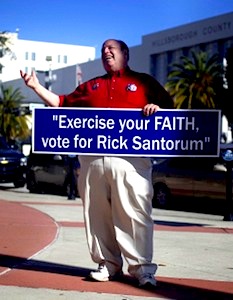
There’s no such discomfort with Santorum,
a former senator from Pennsylvania and a devout
Catholic. He is against abortion,
even in cases of rape or incest. He’s also a proponent
of intelligent design, against homosexuality and contraception,
and opposed to immigration reform.
“Rick Santorum has a consistent record,” said Gary
Bauer, president of the nonprofit conservative
group American Values and co-host
of next weekend’s summit. “To state the obvious,
conservatives have had a hard time coalescing around a candidate.”
Yet with Romney on a fast track — having won the Iowa
caucuses and going into New Hampshire with a luxurious 24-point
lead and South Carolina with a small lead — the
meeting’s only agenda is to anoint an alternative candidate. |
|
Republican
candidates decry "war on religion"
By Stephanie Condon
CBS News: January 7, 2012
MANCHESTER,
N.H. -- Taking a brief pause from attacking each other, the
Republican presidential candidates took a moment in a Saturday
night debate to attack the media
and President Obama for what they
called anti-Christian bigotry.
After a long exchange between ABC debate
moderator George Stephanopoulos and former Massachusetts Gov.
Mitt Romney regarding the regulation of birth control, former
House Speaker Newt Gingrich was prompted to chide "media
bias."
Stephanopoulos asked Romney
if he thinks the Constitution allows a state to
ban birth control, but Gingrich
said, "You don't hear the opposite
question asked."
"Should the Catholic Church be forced
to close its adoption services in Massachusetts because it won't
accept gay couples, which is exactly what the state has done?"
he said. "Should the Catholic Church
be driven out of providing charitable services in the District
of Columbia because it won't give in to secular bigotry? Should
the Catholic Church find itself discriminated against by the
Obama administration on key delivery of services because of
the bias and the bigotry of the administration?"Gingrich
added that "there's a lot more anti-Christian
bigotry today than there is concerning the other side. And none
of it gets covered by the news media."
Texas Gov. Rick Perry jumped in,
saying that "this administration's
war on religion is what bothers me greatly." As
evidence of that "war," he pointed out that the
Obama administration has chosen not to defend in court the Defense
of Marriage Act, the 1996 legal prohibition of federal recognition
of same-sex marriages.
"When we see this administration not giving money to Catholic
charities for sexually trafficked individuals because they don't
agree with the Catholic church on abortion, that
is a war against religion," he said. "And
it's going to stop under a Perry administration."
As for whether he would oppose a state
effort to ban contraception, Romney told Stephanopoulos, "I
would totally and completely oppose any effort to ban contraception,"
adding, "there's no state that wants to do so."
Published
Commentary
@
JV1970
January 8, 2012
"Yes, it is Obama's responsibility to help Christianity!"
REALLY?!?!?!?!?!?!?!?!
I am, for once, speechless, not an easy accomplishment.
Could you accept a non-Christian President, say John
Adams, Thomas Jefferson, Abraham Lincoln, who were Atheists?
"Gingrich, Perry and Santorum, being longtime politicians
and college graduates, know the constitution as well
as anyone," and are deliberately attempting to
trump and subvert it. They may have gone to college
but where did YOU get all this hogwash? Were you home-schooled?
ROBERT
COANE, Jan. 8, 2012
|
|

MAUREEN
DOWD
|
The
Grating Santorum
By MAUREEN DOWD, OP-ED COLUMNIST
The New York Times: January 7, 2012
MANCHESTER,
N.H. - RICK
SANTORUM was locking down the youth vote.
The man who fondly recalls nuns rapping his knuckles with
rulers did some verbal  knuckle-rapping
of his own on Thursday with students at a forum in Concord
hosted by New England College. knuckle-rapping
of his own on Thursday with students at a forum in Concord
hosted by New England College.
Not satisfied with mentioning homosexuality in the same breath
as bestiality and pedophilia, as he did in 2003, Santorum
tried to win over the kids by equating homosexuality with
polygamy.
Even for Santorum, it was a masterpiece of antediluvian abrasiveness
— slapping gays and Mormons at
the same time.
When 17-year-old Rhiannon Pyle,
visiting with her civics class from Newburyport, Mass., pressed
Santorum on how he could believe that all
men are created equal and still object to two men in love
marrying, he began nonsensically frothing.
“So if everybody has the right
to be happy, so if you’re not happy unless you’re
married to five other people, is that O.K.?” he said,
adding, “Well, what about three men?”
The grating Santorum was their worst nightmare of a bad teacher.
He merely got booed; he’s lucky the kids didn’t
TP his car or soap the windows.
In a campaign where W. is an unmentionable,
Santorum is an unexpected revival of Bushian uncompassionate
conservatism.
He got more scattered boos on Friday
at a library in Keene and a private high school in  Dublin.
In Keene, he was asked if he would protect
gay rights, since gays are “children of God”
too. Dublin.
In Keene, he was asked if he would protect
gay rights, since gays are “children of God”
too.
“Serving in the military is not
an unalienable right, it’s a privilege, you’re
selected,” replied the candidate, who wants to
restore “don’t ask, don’t
tell.” He also called marriage
“a privilege, not a right,” for the purpose is
procreation.
Rick Perry baits gays because it’s good politics; Santorum
sincerely means it. His political philosophy is infused with
his über-Catholicism but
lacks humanity.
|
| |
An
Israeli in Iowa
By
SHMUEL ROSNER
Editor and columnist based in Tel Aviv,
is senior political editor for The Jewish Journal
The New York Times: January 6, 2012
The
menaces are few, it turns out, because my
homeland has many true friends among the  Republicans
running for U.S. president this year: candidates who
celebrate Israel as a cause that is religious
(Congresswoman Michele Bachmann),
moral (former Senator
Rick Santorum), strategic
(former Governor Mitt Romney)
or all of the above (Former Speaker
of the House Newt Gingrich). Republicans
running for U.S. president this year: candidates who
celebrate Israel as a cause that is religious
(Congresswoman Michele Bachmann),
moral (former Senator
Rick Santorum), strategic
(former Governor Mitt Romney)
or all of the above (Former Speaker
of the House Newt Gingrich).
And as they hear the voters
in places like Iowa speak,
their
love only grows stronger.
Published
Commentary
Naive
or disingenuous, the senior political editor for  The
Jewish Journal. The
Jewish Journal.
The scheme behind the present Republican cadre is
mere self-serving pandering to the religious right
who are convinced that safeguarding the Jewish State
is their best protection against the invasion of 'sharia'
into America they so fear and 2) that, once Israel
is secure, it will be easy to make Jews 'see the light'
and convert to Christianity. That Jews will all become
Christian they are convinced about and so they will
'reclaim' the Holy Land for Christianity.
THAT is the agenda of the Christian right, not love
of Israel. This circus of religious fervor is nothing
but opportunists pandering to the religious right.
This is the expression of "Christian sharia,"
of the "American Taliban." And Iowa is a
boiling cauldron of seething ultra-conservative religious
right sentiment. They could care less about Jewish
survival. They fear Islam would be a far more dangerous
and stubborn adversary in their Crusade toward worldwide
Christian hegemony.
But America is much bigger than Iowa and not all fundamentalist
fervor. Scratch Bachman's 'religious' cause, Santorum's
'moral' cause, Gingrich's trifecta cause and it's
Romney 'tactical,' without Romney.
This so called 'special relationship' constantly touted
brings the words of the Jesuit John Sheehan: "Every
time anyone says that Israel is our only friend in
the Middle East, I can't help but think that before
Israel, we had no enemies in the Middle East."
ROBERT COANE, Jan. 9, 2012
• • •
"What
is admirable in the focusing of the Republican candidates
is that many emphasize the common heritage in values
and traditions."
Shalom FreedmanJerusalem Israel
Jan. 6, 2012 at 6:39 a.m.
What
common values and traditions when the present climate
of growing intolerance and the preponderance of ultra-conservative
Zionists and ultra-orthdox Jews is more akin to Islamist
practices than it will ever be to America's democratic
heritage? Unless, that is, you are comparing it to
the intent of the Christian right's stated agenda.
ROBERT COANE, Jan. 9, 2012
|
|
| |
The
Iowa-Is-So-Important Phase Ends, the Iowa-Is-So-Over Phase Begins
By ANDREW ROSENTHAL
The New York Times: January 4, 2012
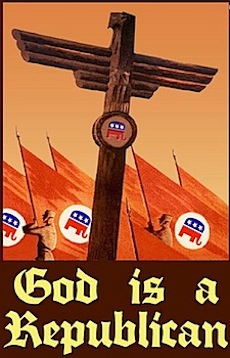 ES
MOINES—In
2008,
the very conservative Evangelical Christians
in Iowa muddled the Republican presidential nominating contest,
giving their support to an unelectable candidate, Mike
Huckabee, who won here over the
person that Republicans were most likely to settle for in the
end, John McCain. That meant the G.O.P.
had to spend millions more dollars, run more nasty ads, and
toss around more radical right-wing ideas before turning their
attention to the general election. ES
MOINES—In
2008,
the very conservative Evangelical Christians
in Iowa muddled the Republican presidential nominating contest,
giving their support to an unelectable candidate, Mike
Huckabee, who won here over the
person that Republicans were most likely to settle for in the
end, John McCain. That meant the G.O.P.
had to spend millions more dollars, run more nasty ads, and
toss around more radical right-wing ideas before turning their
attention to the general election.
This year, the very
conservative Evangelical Christians in Iowa muddled the Republican
presidential nominating contest, giving their support to an
unelectable candidate, Rick Santorum, who fought to a
draw with the person Republicans seem most likely to settle
for in the end, Mitt Romney. That means
the G.O.P. will have to spend millions of more dollars, run
more nasty ads and toss around more radical right-wing ideas
before turning their attention to the general election.
The process, in 2008, meant that a politician
who had once been essentially a moderate, Mr.
McCain, had to transform himself into a right winger
and the party went into the general far out of the nation’s
true ideological mainstream.
A lot is going to be said about the ideological divide in the
Republican Party. Don’t make too much of that. The party
is divided about which deeply unsatisfying candidate it is going
to pick, but there is no doubt about its
ideology. It
is pinned against the right-wing wall of American politics.
|
|
Iowa’s
Republicans, Divided by Gym Partitions and Conservative Ideologies
By DAVID FIRESTONE
The New York Times: January 4, 2012
Disunity
was virtually the only consistent theme to emerge from Iowa’s
caucuses, actually more party rallies than real delegate-selection
events, even with all the candidates shoved against
the far-right wall of the ideological spectrum — including
Mr. Romney, who seemed profoundly uncomfortable
there. The state’s highly conservative Republican voters
had to choose based on extremely small distinctions.
Several voters here in Altoona, 10 miles northeast of downtown
Des Moines, said they had picked the one who seemed most
sincerely committed to the anti-abortion message. That
led Perry Franklin, a U.P.S.
employee, and his wife Lisa,
a Wal-Mart cashier, to choose Mr. Santorum,
particularly after he was endorsed by the Family
Leader, an influential evangelical group.
“And he signed their marriage
pledge, which the others didn’t,” said
Mrs. Franklin, referring to a
vow promulgated by the Family Leader
that equates same-sex marriage with
bigamy and polygamy and requires signers to promise
to stay faithful to their spouses. (Actually, Michele
Bachmann and Rick Perry signed it, too.)
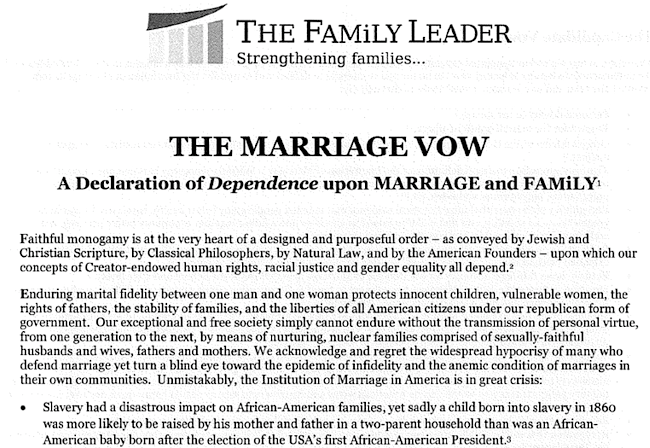
|
| |
Churchgoers
boost Rick Santorum on Sunday before Iowa caucuses
By
GEOFF EARLE in Des Moines, Iowa, and S.A. MILLER in Washington,
DC
The New York Times: January 2, 2012
On
the Sunday before tomorrow’s caucuses, scores
of God-fearing Iowans looked
on in  wonderment
at Rick Santorum’s Lazarus-like
rise wonderment
at Rick Santorum’s Lazarus-like
rise  in
the polls. in
the polls.
After services at Grace Church, which draws up to 1,400 worshippers
each week, Victor Wicker,
a history teacher, said he was “hopeful”
of Santorum’s chances as the latest polls show him closing
in on Mitt Romney.
“You like people not at the bottom. Now that he’s
rising up again, I’m not going to be wasting my vote.
I want to go with somebody who might win!” he said as
he held the Bible
he brought with him to services.
Santorum capitalized on his surge by talking tough on international
policy — saying he would 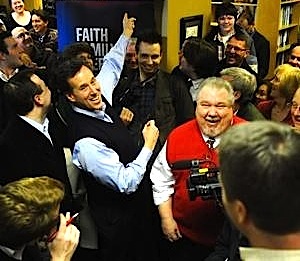 order
US airstrikes on Iran’s nuclear sites if the
Islamic country refused to open
facilities to
outside inspectors. order
US airstrikes on Iran’s nuclear sites if the
Islamic country refused to open
facilities to
outside inspectors.
“I would be working openly with
the state of Israel, and I would be
saying to Iran, ‘You need to open up those facilities.
You begin to dismantle them and make them available to inspectors,
or we will degrade those facilities through airstrikes and
make it very public that we are doing that,’ ”
Santorum said on NBC’s “Meet
the Press.”
As for Gingrich, his personal foibles
— he is on this third marriage after being unfaithful
in the first two — seem to have taken their toll on
his popularity among churchgoers
|
| |
Santorum
Events Reflect Rising Iowa Numbers
By JEREMY W. PETERS
The New York Times: December 29, 2011
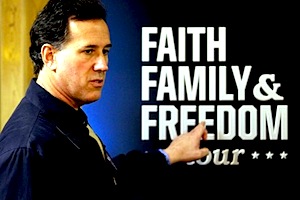 Mr.
Santorum, for his part, used his newfound popularity
to make a stand for his brand of unflinching
social conservatism. And Iowa’s
splintered religious Republican base appears to be responding. Mr.
Santorum, for his part, used his newfound popularity
to make a stand for his brand of unflinching
social conservatism. And Iowa’s
splintered religious Republican base appears to be responding.
“When you look at all the candidates out there, you
see bits and pieces you like in every one,” said Brian
Gossett, 35, an electrician who visited an educational
center in Cedar Rapids on Wednesday night to hear Mr. Santorum
speak. “He’s the one we
see the most in, because of his Christian values.”
|

SARAH
PALIN'S
PRAYER WARRIORS
|
Appealing
to Evangelicals,
Hopefuls Pack Religion Into Ads
By JEREMY W. PETERS
The New York Times: December 27, 2011
DES
MOINES — There is Rick Perry,
a stained-glass window and a large illuminated cross  over
his right shoulder, looking more preacher than politician.
An aerial shot of a soaring church steeple zooms into focus
a few seconds later. Then — blink
and you’ll miss it — a picture of Mr. Perry, the
Texas governor, with his arm around Mike Huckabee flashes
on the screen. over
his right shoulder, looking more preacher than politician.
An aerial shot of a soaring church steeple zooms into focus
a few seconds later. Then — blink
and you’ll miss it — a picture of Mr. Perry, the
Texas governor, with his arm around Mike Huckabee flashes
on the screen.
In more overt ways than ever, Republican
candidates vying for support
from Iowa caucusgoers are turning to
religious language and imagery in their advertisements,
seeking to appeal to the Christian conservative
base that will play a pivotal role in determining the victor
here.
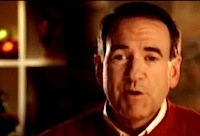
Gone are the suggestive and supposedly subliminal images of
campaigns past, as when Mr. Huckabee
caused a stir in 2007 after releasing
a commercial that appeared to show a
cross floating in the background.
The new, more pointed religious references
reflect how campaigns are scrambling for support among evangelicals
who are still divided over whom to support as the caucuses
near.

“At this point in the game, the
candidates in the G.O.P. primary don’t have the time
or the money for subtlety,” said Mark McKinnon,
a Republican media strategist. “They
will light a fire and stand by a burning bush in order to
send a signal to evangelicals,
‘I’m one of you, vote for
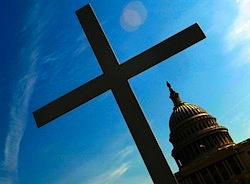 me.’
” me.’
”
Mr. Perry has released four commercials
in which Christianity is a theme.
“We grew up in small towns, raised
with Christian values,” his wife, Anita
Perry, says in one spot running in Iowa now. “And
we know Washington, D.C., could use some of that.”
 And an ad in which Newt Gingrich and
his wife, Callista, offer their Christmas greetings
pivots first to a sketch of a nativity scene and then to a
church.
And an ad in which Newt Gingrich and
his wife, Callista, offer their Christmas greetings
pivots first to a sketch of a nativity scene and then to a
church.
Sarah Palin has often referred
to her support from “prayer warriors,”
a term known among evangelicals as those who engage
in battle with Satan.
But what is different this year, media strategists and analysts
said, is the extent to 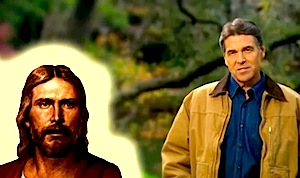 which
the candidates are distributing such
unambiguously religious messages so widely. which
the candidates are distributing such
unambiguously religious messages so widely.
...the ad Mr. Perry has received
the most criticism for this election, in which he says “there’s
something wrong in this country when gays can serve openly
in the military but our kids can’t openly celebrate
Christmas or pray in school,” was
specifically written and staged by the governor’s media
team to appeal to Christians who feel the Obama administration
is hostile to public expressions of faith.
The scene, a verdant, bucolic hillside, was meant to invoke
a meditative setting suitable for prayer.
COMMENTARY
"The
United States is not a Christian nation any more  than
it
is a Jewish or a Mohammedan nation." ~ JOHN ADAMS than
it
is a Jewish or a Mohammedan nation." ~ JOHN ADAMS
"I distrust those people who know so well what
God wants them to do because I notice it always coincides
with their own desires."
~ SUSAN B. ANTHONY
"In the affairs of the world, men are saved,
not by faith, but by the want of it." ~
BENJAMIN FRANKLIN
"In every country and in every age, the priest
has been hostile to liberty. He is always in alliance
with the despot, abetting his abuses in return for
protection to his own"
~ THOMAS JEFFERSON
"The Bible is not my Book and Christianity is
not my religion. I could never give assent to the
long complicated statements of Christian dogma."
~ ABRAHAM LINCOLN
"What has been Christianity’s fruits? Superstition,
Bigotry and Persecution."
~ JAMES MADISON
"To argue with a man who has renouced his reason
is like giving medicine to the dead." ~
THOMAS PAINE
"The United States of America should have a foundation
free from the influence of clergy."
~ GEORGE WASHINGTON
Need I say more? I can.
"In those parts of the world where learning and
science have prevailed, miracles have ceased; but
in those parts of it as are barbarous and ignorant,
miracles are still in vogue." ~
ETHAN ALLEN
ROBERT COANE, Dec. 28, 2011
|
|
| |
In
Islamic Law, Gingrich Sees a Mortal Threat to U.S.
By SCOTT SHANE
The New York Times: December 21, 2011
WASHINGTON
— Long before he announced his presidential run this
year, Newt Gingrich had become
the most prominent American politician to embrace an alarming
premise: that  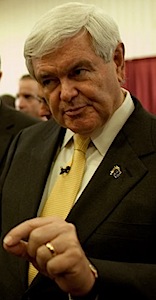 Shariah,
or Islamic law, poses a threat to the United States as grave
as or graver than terrorism. Shariah,
or Islamic law, poses a threat to the United States as grave
as or graver than terrorism.
“I believe Shariah is a mortal
threat to the survival of freedom in the United States and
in the world as we know it,” Mr. Gingrich said
in a speech to the American Enterprise
Institute in Washington in July 2010 devoted to what
he suggested were the hidden dangers
of Islamic radicalism. “I think
it’s that straightforward and that real.”
The idea that Shariah poses a danger in the United States,
where the census pegs Muslims as less than 1 percent of the
population, strikes many scholars as quixotic.
Even within that 1 percent, most American Muslims have no
enthusiasm for replacing federal and
state law with Shariah, as some conservatives fear, let alone
adopting such  ancient
prescriptions as stoning for adulterers,
said Akbar Ahmed, chairman of
Islamic studies at American University in Washington. ancient
prescriptions as stoning for adulterers,
said Akbar Ahmed, chairman of
Islamic studies at American University in Washington.
The notion of a threat from Shariah to the United States “takes
your breath away, it’s so absurd,” Dr. Ahmed said.
He sees political demagoguery in the
anti-Shariah campaign, which fueled
rallies against mosques in the last two years from Manhattan
to Tennessee.
Mohamed Elibiary, a Muslim and
an adviser to law enforcement agencies in Texas and to the
Department of Homeland Security, is
a conservative Republican who said he once idolized Mr. Gingrich.
He said he no longer did.
He said the anti-Shariah campaign in the United States was
“propaganda for jihadists,”
offering fuel for the idea of a titanic clash of faiths. Those
who truly want to protect American values should talk to Muslims,
he said, not demonize them.
|
|
Gingrich
Iowa staffer resigns after "cult of Mormon" comment
By Lucy Madison
CBS News: December 13, 2011
Less than a week after being tapped as
Newt Gingrich's political director
in Iowa,  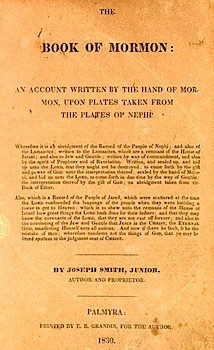 Craig
Bergman resigned on Tuesday for suggesting evangelicals
are ready to help God "expose the
cult of Mormon." Craig
Bergman resigned on Tuesday for suggesting evangelicals
are ready to help God "expose the
cult of Mormon."
In a focus group conducted before he officially joined the Gingrich
campaign, Bergman, a Tea Party
supporter who previously advocated on behalf of Sarah
Palin, suggested that a "national pastor" could
lead an effort to defeat Mitt Romney over
his religion.
"There is a national pastor who is
very much on the anti-Mitt Romney bandwagon," Bergman
said, according to the Iowa Republican,
which sponsored the focus group with McClatchy newspapers.
"A lot of the evangelicals believe
God would give us four more years of Obama just for the opportunity
to expose the cult of Mormon...There's a thousand pastors ready
to do that."
This is not the first time the word "cult"
has been applied to Mormonism in
reference to Romney
during the 2012 presidential election cycle.
In October, a pastor associated with Texas
Governor Rick Perry leveled a similar charge against
Mormonism - a faith to which both Romney
and fellow GOP hopeful Jon Hunstman
belong.

|

ROSS DOUTHAT
|
2012 -
The Tempting of the Christian Right
By ROSS DOUTHAT
December 6, 2011
More
than any other Republican constituency, religious conservatives
have good reasons to
be wary of Newt Gingrich. As the leader of a right-wing insurgency
in the early 1990s, he often kept their causes at arm’s
length — deliberately excluding issues like abortion
and school prayer from the Contract With America, for instance.
As Speaker of the House, he undercut their claim to the moral
high ground by carrying on an extramarital affair even as
his party was impeaching Bill Clinton for lying under oath
about adultery.
During his years in the political wilderness, though,
Gingrich found religion –
both as a convert to the Roman Catholic Church and as a born-again
champion of socially conservative causes. He’s
spent the last decade producing books and documentaries about
America’s Christian heritage.
He raised money for a referendum to recall the judges who
legalized same-sex marriage in Iowa. His
public rhetoric borrows the tropes of the religious
right — emphasizing the dangers
of secularism, attacking the usurpations of activist judges,
and so on. And when he talks about his checkered personal
life, it’s always in the language
of sin, repentance and redemption.
Now his path to the nomination depends
on this conversion paying off. If Gingrich hopes to outlast
Mitt Romney, he needs to win over evangelicals wary of Mormonism
and social conservatives worried about Romney’s many
flip-flops on their issues. He needs the Republican Party’s
values voters to forgive his past indiscretions and embrace
him as their champion. And his rise in the polls has prompted
a lively debate among religious conservatives, both in Iowa
and nationally, about whether they should do just that —
whether he’s really changed, whether his various conversions
are sincere, and whether they can trust him.
But these are the wrong questions. The
real issue for religious conservatives isn’t whether
they can trust Gingrich. It’s whether they can afford
to be associated with him.
Conservative Christianity in America,
both evangelical and Catholic, faces a looming demographic
challenge: A rising generation that
is more unchurched than any before it, more liberal on issues
like gay marriage, and allergic to the apocalyptic rhetoric
of the Pat Robertson-Jerry Falwell era. To many younger
Americans, religious conservatism as they know it often seems
to stand for a kind of institutionalized hypocrisy —
a right-wing Tartufferie that’s
incensed by the idea of gay wedlock but tolerant of straight
divorce, forgiving of Republican sins but judgmental about
Democratic indiscretions, and eager to apply moral litmus
tests only on issues that benefit the political right.
Rallying around Newt Gingrich,
effectively making him the face
of Christian conservatism in this Republican primary
season, would ratify all of these impressions. It isn’t
just that he’s a master of selective moral outrage whose
newfound piety has been turned to consistently partisan ends.
It’s
that his personal history — not only the two divorces,
but also the repeated affairs and the way he behaved during
the dissolution of his marriages — makes him the most
compromised champion imaginable for a movement that’s
laboring to keep lifelong heterosexual monogamy on a legal
and cultural pedestal.
"She
isn't young enough or pretty enough to be the President's
wife."
~
Newt Gingrich, on his first wife Jackie Battley
|
|
|
|
|
| "He
walked out in the spring of 1980.... By September, I
went into the hospital for my third cancer surgery.
The two girls came to see me, and said, 'Daddy is downstairs.
Could he come up?' When he got there, he wanted to discuss
the terms of the divorce while I was recovering from
my surgery."
~
Jackie Battley
|
| |
(Full
text)
|
| |
2012
-
A Defiant Herman Cain Suspends His Bid for Presidency
By SUSAN SAULNY
The New York Times: December
3, 2011
An
unapologetic and defiant Herman Cain
suspended his presidential campaign on  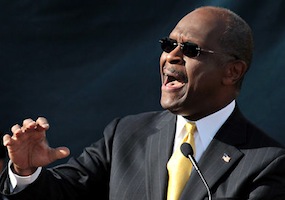 Saturday,
pledging that he “would not go away” even as he
abandoned the Republican presidential race in
the face of escalating accusations of sexual misconduct. Saturday,
pledging that he “would not go away” even as he
abandoned the Republican presidential race in
the face of escalating accusations of sexual misconduct.
“As of today, with
a lot of prayer and soul-searching,
I am suspending my presidential campaign,” Mr.
Cain said at a rally in Atlanta, surrounded by supporters
chanting his name.
Mr. Cain said he would issue an endorsement
soon. With his wife, Gloria, at his side at the Atlanta rally,
Mr. Cain said the accusations of sexual harassment and of
a 13-year affair were untrue. “I’m
at peace with my God,” he said. “I’m
at peace with my wife, and she is at peace with
me.”
|
|
Poll
Finds Religion Is Early Drag on Romney
By
LAURIE GOODSTEIN
The New York Times: November 23, 2011
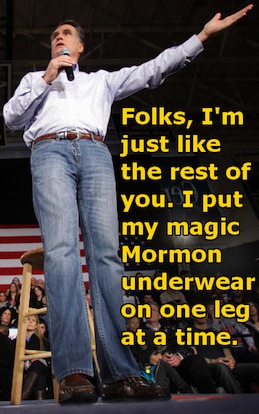  Mitt
Romney’s Mormon faith will
most likely cost him support in the primaries, but
even Republicans with reservations about his religion would
rally to his side in a general election against President
Obama, according to a poll released Wednesday. Mitt
Romney’s Mormon faith will
most likely cost him support in the primaries, but
even Republicans with reservations about his religion would
rally to his side in a general election against President
Obama, according to a poll released Wednesday.
The poll, by the Pew Research Center, examined the impact
of religion on the 2012 election in light of claims by some
analysts that a Mormon stigma is significant enough to impede
Mr. Romney’s run for president.
According to the poll, the greatest
resistance to Mr. Romney among Republicans comes from white
evangelical Protestants, about half of whom said the
Mormon religion is not a Christian faith. Evangelicals,
who include Southern Baptists, are those
who
emphasize a personal relationship with Jesus, the unique
authority of the Bible and the imperative
to spread the faith. They are a big chunk of the Republican
base and a major factor in the early nominating states of
Iowa and South Carolina.
|
|
Cain:
God convinced me to run for president
By Lindsey Boerma
CBS News: November 12, 2011
ATLANTA,
Ga. - Herman Cain, whose campaign
could use some redemption in the wake of a  sexual
harassment scandal, told a crowd of young Republicans on Saturday
that God convinced him to run for president
and that he "prayed and prayed
and prayed" about it. sexual
harassment scandal, told a crowd of young Republicans on Saturday
that God convinced him to run for president
and that he "prayed and prayed
and prayed" about it.
The Republican contender made no mention of the allegations
from former subordinates at the National Restaurant Association.
But his comments here were accented
with more than the usual references to his faith and his calling
to politics.
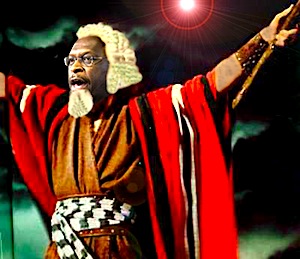 "I
prayed and prayed and prayed. I'm a man of faith, I had to
do a lot of praying for this one, more praying than I'd ever
done before in my life," Cain told a
crowd of more than 100 at the Young Republican National Federation,
an event hosted by the Georgia Young Republicans at the Westin
Peachtree Plaza. "And when
I finally realized that it was God saying that this is what
I needed to do, I was like Moses: 'You've got the wrong man,
Lord. Are you sure?'" "I
prayed and prayed and prayed. I'm a man of faith, I had to
do a lot of praying for this one, more praying than I'd ever
done before in my life," Cain told a
crowd of more than 100 at the Young Republican National Federation,
an event hosted by the Georgia Young Republicans at the Westin
Peachtree Plaza. "And when
I finally realized that it was God saying that this is what
I needed to do, I was like Moses: 'You've got the wrong man,
Lord. Are you sure?'"
Once he
made the decision to run, the former chief executive of Godfather's
Pizza said, "I did not look back."
|

MAUREEN
DOWD
\
|
Anne
Frank, a Mormon?
By MAUREEN DOWD – OP-ED COLUMNIST
The New York Times: October 18, 2011
WASHINGTON
– At an appearance at George Washington University here
Saturday night, Bill Maher (right)
bounded into territory that the news media have been gingerly
tiptoeing 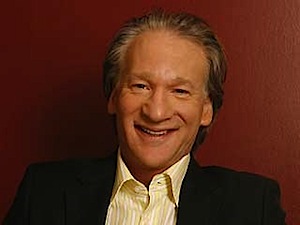 around.
Magic underwear. Baptizing dead people.
Celestial marriages. Private planets. Racism. Polygamy. around.
Magic underwear. Baptizing dead people.
Celestial marriages. Private planets. Racism. Polygamy.
“By any standard, Mormonism is more ridiculous than
any other religion,” asserted the famously
nonbelieving comic who skewered
the “fairy tales”
of several faiths 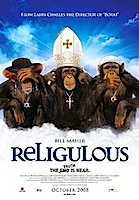 in
his documentary “Religulous.”
“It’s a religion founded on the idea of polygamy.
They call it The Principle.
That sounds like The Prime Directive in ‘Star Trek.’
” in
his documentary “Religulous.”
“It’s a religion founded on the idea of polygamy.
They call it The Principle.
That sounds like The Prime Directive in ‘Star Trek.’
”
He said he expects the Romney crowd — fighting back
after Robert Jeffress, a Texas Baptist pastor supporting Rick
Perry, labeled Mormonism a non-Christian “cult”
— to once more “gloss over the differences between
Christians and Mormons.”
Maher was not easy on the religion
he was raised in either. He referred to the Roman
Catholic Church as “an
international child sex ring.”
But atheists, like Catholics and evangelical Christians, seem
especially wary of Mormons, dubbed the “ultimate shape-shifters”
by Maher.
In a Washington Post-Pew Research Center poll released on
Tuesday, people were asked what single word came to mind for
Republican candidates. For Herman Cain it was 9-9-9; for Rick
Perry, Texas; and for Mitt Romney, Mormon. In
the debate Tuesday night, Romney said it was repugnant that
“we should choose people based
on their religion.”
 Another
famous nonbeliever, Christopher Hitchens
(right), wrote
in Slate on Monday about
“the weird and sinister belief system of the LDS,”
the Church of Jesus Christ of Latter-day Saints. Another
famous nonbeliever, Christopher Hitchens
(right), wrote
in Slate on Monday about
“the weird and sinister belief system of the LDS,”
the Church of Jesus Christ of Latter-day Saints.
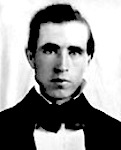
Aside from Joseph Smith (left),
whom Hitchens calls “a fraud and conjurer well known
to the authorities in upstate New York,” the writer
also wonders about the Mormon practice of amassing archives
of the dead and “praying them in” as a way to
“retrospectively ‘baptize’ everybody as
a convert.”
Hitchens noted that they “got
hold of a list of those put to death by the Nazis’ Final
Solution” and “began making these massacred Jews
into  honorary
LDS members as well.” He called it
“a crass attempt at mass identity theft from the deceased.” honorary
LDS members as well.” He called it
“a crass attempt at mass identity theft from the deceased.”
The Mormons even baptized Anne
Frank.
It took Ernest
Michel (right),
then chairman of the American Gathering
of 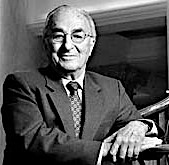 Jewish
Holocaust Survivors, three years to get Mormons to
agree to stop proxy-baptizing Holocaust victims. Jewish
Holocaust Survivors, three years to get Mormons to
agree to stop proxy-baptizing Holocaust victims.
Mormons desisted in 1995 after
Michel, as the Jewish
Telegraphic Agency reported, “discovered
that his own mother, father, grandmother and best childhood
friend, all from Mannheim, Germany, had been posthumously
baptized.”
Michel told the news agency
that “I was hurt that my parents,
who were killed as Jews in Auschwitz, were being listed as
members of the Mormon faith.”
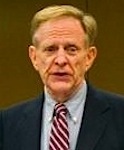 Richard
Bushman (right),
a Mormon who is a professor emeritus of history at Columbia
University, said that after “the
Jewish dust-up,” Mormons “backed away”
from “going to extravagant lengths to collect the names
of every last person who ever lived and baptize them —
even George Washington.”
Now they will do it for Mormons who
bring a relative or ancestor’s name into the temple,
he said. Richard
Bushman (right),
a Mormon who is a professor emeritus of history at Columbia
University, said that after “the
Jewish dust-up,” Mormons “backed away”
from “going to extravagant lengths to collect the names
of every last person who ever lived and baptize them —
even George Washington.”
Now they will do it for Mormons who
bring a relative or ancestor’s name into the temple,
he said.
Bushman said that “Mormons believe that Christ is the
divine son of God who atoned for our sins, but we don’t
believe in the Trinity in the sense that there are three in
one. We believe the zFather, the Son and the Holy Ghost are
three distinct persons.”
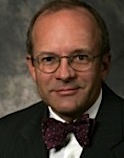 Kent
Jackson (right),
the associate dean of religion at Brigham
Young University, says that while
Mormons are Christians, “Mormonism is not part of the
Christian family tree.” Kent
Jackson (right),
the associate dean of religion at Brigham
Young University, says that while
Mormons are Christians, “Mormonism is not part of the
Christian family tree.”
It probably won’t comfort
skeptical evangelicals and Catholics to know that Mormons
think that while other Christians merely
“have a portion of the truth, what God revealed to Joseph
Smith is the fullness of the truth,” as Jackson
says. “We have no qualms about
saying evangelicals, Catholics and Protestants can go to heaven,
including Pastor Jeffress. We just believe that the highest
blessings of heaven come” to Mormons.
As for
those planets that devout Mormon couples might get after death,
Jackson says that’s a canard. But Bushman
says it’s part of “Mormon lore,” and that
it’s based on the belief that
if humans can become like God, and God has the whole universe,
then  maybe
Mormons will get to run a bit of that universe. maybe
Mormons will get to run a bit of that universe.
As for the special
garment that Mitt wears, “we wouldn’t say ‘magic
underwear,’ ” Bushman explains.
It is meant to denote “moral protection,” a sign
that they are “a consecrated people like the priests
of ancient Israel.”
And it’s not only a one-piece
any more. “There’s a two-piece
now,” he said.
Republicans are the ones who
have made faith part of the presidential test. Now we’ll
see if Mitt can pass it.
|
|
The
Evangelical Rejection of Reason
By KARL W. GIBERSON and RANDALL J. STEPHENS
The New York Times: October 17, 201
Quincy,
Mass. - THE Republican presidential
field has become a showcase of evangelical anti-intellectualism.
Herman Cain, Rick Perry and Michele
Bachmann deny that climate change is real and caused
by humans. Mr. Perry and Mrs. Bachmann
dismiss evolution as an unproven theory. The two candidates
who espouse the greatest support for science, Mitt
Romney and Jon M. Huntsman Jr.,
happen to be Mormons, a faith regarded
with mistrust by many Christians.
The rejection of science seems
to be part of a politically monolithic red-state fundamentalism,
textbook evidence of an unyielding ignorance on the part of
the religious. As one fundamentalist slogan puts it, “The
Bible says it, I believe it, that settles it.”
But evangelical Christianity need not be defined by the simplistic
theology, cultural isolationism and stubborn anti-intellectualism
that most of the Republican candidates have embraced.
Like other evangelicals, we
accept the centrality of faith in Jesus Christ and look to
the Bible as our sacred book, though we find it hard to recognize
our religious tradition in the mainstream evangelical conversation.
Evangelicalism at its best seeks a biblically grounded expression
of Christianity that is intellectually engaged, humble and
forward-looking. In contrast, fundamentalism is literalistic,
overconfident and reactionary.
Fundamentalism appeals to evangelicals
who have become convinced that their country has been overrun
by a vast secular conspiracy; denial is the simplest and most
attractive response to change. They
have been scarred by the elimination of prayer
in schools; the removal of nativity scenes from public places;
the increasing legitimacy of abortion and homosexuality; the
persistence of pornography and drug abuse; and acceptance
of other religions and of atheism.
In response, many evangelicals
created what amounts to a “parallel
culture,” nurtured by church,
Sunday school, summer camps and colleges, as well as publishing
houses, broadcasting networks, music festivals and counseling
groups. Among evangelical leaders,
Ken Ham, David
Barton and James C. Dobson
have been particularly effective orchestrators — and
beneficiaries — of this subculture.
Scholars and publications like
Books & Culture, Sojourners and The Christian Century,
offer an alternative to the self-anointed leaders.
They recognize that the Bible
does not condemn evolution and says next to nothing about
gay marriage. They understand that Christian theology can
incorporate Darwin’s insights and flourish in a pluralistic
society.
 Americans have always trusted
in God, and even today atheism is little
more than a quiet voice on the margins. Faith, working
calmly in the lives of Americans from George Washington to
Barack Obama, has motivated some of America’s finest
moments. But when the faith of so many Americans becomes an
occasion to embrace discredited, ridiculous and even dangerous
ideas, we must not be afraid to speak out, even if it means
criticizing fellow Christians.
Americans have always trusted
in God, and even today atheism is little
more than a quiet voice on the margins. Faith, working
calmly in the lives of Americans from George Washington to
Barack Obama, has motivated some of America’s finest
moments. But when the faith of so many Americans becomes an
occasion to embrace discredited, ridiculous and even dangerous
ideas, we must not be afraid to speak out, even if it means
criticizing fellow Christians.
|

ORAL
ROBERTS UNIVERSITY
entrance
|
For
Bachmann, God and Justice Were Intertwined
By SHERYL GAY STOLBERG
The New York Times: October 13, 2011
TULSA,
Okla. — Michele Bachmann was 22 and newly married
when, in the fall of 1979,   she
and 53 other aspiring lawyers arrived on the manicured campus
of Oral
Roberts University here. They
were the inaugural class in an unusual educational experiment:
a law school rooted in charismatic Christian belief. she
and 53 other aspiring lawyers arrived on the manicured campus
of Oral
Roberts University here. They
were the inaugural class in an unusual educational experiment:
a law school rooted in charismatic Christian belief.
“We hope to guide our
students to a deeper understanding of their spiritual gifts
and of their place in God’s kingdom,” the
school’s dean, Charles Kothe,
wrote in the first edition of its law review, The
Journal of Christian Jurisprudence. The
aim, he said, was to train the next
generation of legal minds to “integrate their Christian
faith into their chosen profession,” and to “restore
law to its historic roots in the Bible.”
Today, as a Republican congresswoman from Minnesota seeking
her party’s nomination for president, Mrs. Bachmann
often talks of her work as a lawyer, describing herself as
a “former federal tax litigation attorney,”
though not identifying her employer
as the Internal Revenue Service. She points
to her master’s degree from the College of William and
Mary in Virginia, from a nine-month program in tax law.
But the far more formative experience was
one she rarely discusses in front of secular
 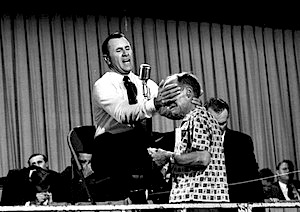 audiences:
the legal education she received at Oral
Roberts University, founded by the Christian
televangelist and Pentecostal faith healer of
that name. It was,
one fellow student recalls, a “Petri
dish of conservatism and Judeo-Christian thought.” audiences:
the legal education she received at Oral
Roberts University, founded by the Christian
televangelist and Pentecostal faith healer of
that name. It was,
one fellow student recalls, a “Petri
dish of conservatism and Judeo-Christian thought.”
Mrs. Bachmann’s studies here exposed her to
ideas — God is the source of law;
the Constitution is akin to a biblical covenant, binding on
future generations; the founders did not intend for a strict
separation of church and state — that
are percolating throughout the  2012
race for the presidency, as social conservative candidates
like Gov. Rick Perry of Texas and Rick
Santorum, the former senator from Pennsylvania,
court the evangelical Christian vote. But
the philosophy has its best-known advocate in
Mrs. Bachmann. 2012
race for the presidency, as social conservative candidates
like Gov. Rick Perry of Texas and Rick
Santorum, the former senator from Pennsylvania,
court the evangelical Christian vote. But
the philosophy has its best-known advocate in
Mrs. Bachmann.
Mrs. Bachmann worked as a research assistant to John
Eidsmoe on his 1987 book, “Christianity
and the Constitution: The Faith of Our Founding Fathers,”
which argues that “religion and
politics cannot be totally separated” and that
“America was and to a large extent
still is a Christian nation.“ She studied
“legal institutions and values” with Herb
Titus, a Harvard-trained lawyer who hears his philosophy
in Mrs. Bachmann’s words.
“Her belief is consistent
with a biblical and a Christian understanding of the Constitution,”
Mr. Titus said.
“We were encouraged to make a difference,”
said Rich Gradel,
an Oral Roberts law graduate and solo practitioner in Tulsa.
“A lot of us could have gone elsewhere. We came here
because we felt — not everybody, but a
whole lot of us — felt like God led us here.”
|
|
Huntsman:
I thought Cain 9-9-9 plan was "price of pizza"
By Brian Montopoli
CBS News: October 11, 2011
| |
 "You
turn the 9-9-9 plan
upside down, and the devil's in the details," [Michele
Bachmann] said -- possibly suggesting that the plan
was actually "6-6-6"
-- the "number of the beast" in the Bible.
"You
turn the 9-9-9 plan
upside down, and the devil's in the details," [Michele
Bachmann] said -- possibly suggesting that the plan
was actually "6-6-6"
-- the "number of the beast" in the Bible. |
 |
|
|
In
Iowa, Religious Right Is Now a Force Divided
By TRIP GABRIEL
The New York Times: October 10, 2011
DES MOINES
— ...many Republicans may ultimately rally around a
candidate they consider more electable in the general election
against President Obama, and as the campaign 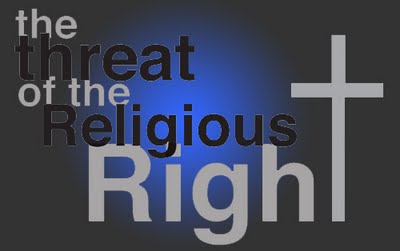 goes
forward a better-financed candidate like Mr. Romney or Mr.
Perry may be able to convey that message. goes
forward a better-financed candidate like Mr. Romney or Mr.
Perry may be able to convey that message.
But in the meantime, the lower-tier
candidates are attracting uncommon attention,
and one reason is the influence of Christian
conservatives, who make up the bulk of the voters in
the Republican caucuses.
In 2008 they rallied behind Mike Huckabee to give him
a surprise victory over Mr. Romney, who had spent $10 million
and a year on the ground.
But this time, social conservatives
are divided among several candidates who are competing
fiercely for their support — each
boasting of rock-ribbed opposition to abortion and same-sex
marriage. The candidates are also finding ways to tie
other conservative positions, like ending big government and
regulations, to principles of Christian
faith.
Even though abortion and same-sex
marriage rank relatively low on the list of issues
for Republicans generally — and certainly behind
the economy — they fire
up activists, who have a disproportionate
influence in a caucus state....
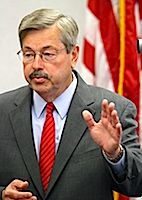 Some
candidates are paying particular attention to a subset of
social conservatives, home-school parents,
whom one strategist compared to postal carriers:
neither sleet nor dark of night will keep them from the caucuses. Some
candidates are paying particular attention to a subset of
social conservatives, home-school parents,
whom one strategist compared to postal carriers:
neither sleet nor dark of night will keep them from the caucuses.
“I would say those home-schooling
for faith-based reasons are going to go hand in glove with
an interest in the social issues like life and  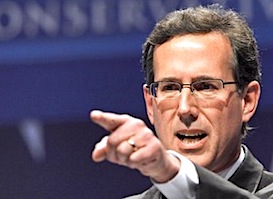 marriage,”
said Bill Gustoff (right),
a lobbyist for the Network of
Iowa Christian Home Educators. He
estimated that half of the 30,000 home-school households would
have a voter at a caucus, a significant slice in an election
that draws about 120,000 total voters. marriage,”
said Bill Gustoff (right),
a lobbyist for the Network of
Iowa Christian Home Educators. He
estimated that half of the 30,000 home-school households would
have a voter at a caucus, a significant slice in an election
that draws about 120,000 total voters.
At least two candidates, Mr.
Santorum and Mrs. Bachmann, both of whom have home-schooled
their children, have staff members here to organize
this vote.
One Bachmann aide, Peter Waldron
(left), gathered
16 evangelical pastors in Des
Moines 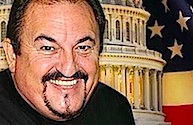 last
week to discuss strategy. “These are our caucus-builders,”
Mr. Waldron said. “We have a very
deliberate plan. It’s been thought-out, prayed over.” last
week to discuss strategy. “These are our caucus-builders,”
Mr. Waldron said. “We have a very
deliberate plan. It’s been thought-out, prayed over.”
Although most pastors are careful not to endorse a candidate
from 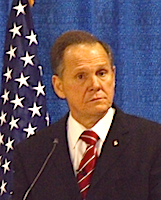 the
pulpit, those who are politically active make it clear whom
they favor. the
pulpit, those who are politically active make it clear whom
they favor.
“My favorite phrase in
our church is, ‘I will not tell you who to vote for,’
” said the Rev. Bill Tvedt (right)
of Jubilee Family Church in Oskaloosa. “But
you won’t need anyone to tell you who to vote for by
the time you’re taught scriptural world view.”
Mr. Tvedt supports Mrs.
Bachmann — and predicted that most of his
congregation of 150 would caucus for her — saying
she is one of “the biggest opponents
of what we would call progressive, socialist,
liberal agendas.”
|

BILL
KELLER
|
Is
the Tea Party Over?
By BILL KELLER, OP-ED COLUMNIST
The New York Times: October 9, 2011

 Austin,
Tex.- The editor of Texas Monthly,
Jake Silverstein (right),
sums up Perry as “a child
of the mythology of the frontier,” in which “every
man is more or less for himself, a good neighbor is one who
needs no help, and efforts by the government to interfere
are not to be trusted.” Austin,
Tex.- The editor of Texas Monthly,
Jake Silverstein (right),
sums up Perry as “a child
of the mythology of the frontier,” in which “every
man is more or less for himself, a good neighbor is one who
needs no help, and efforts by the government to interfere
are not to be trusted.”
To this Perry adds a damn-the-pointy-heads denialism
— global warming is a hoax, evolution
is just “a theory that’s out there”
— as well as a wink to the evangelicals,
a nod to the executioner, and an ardent defense of personal
liberties for those who are heterosexual and don’t need
an abortion. He may not believe in evolution, but his
survival-of-the-fittest view of society is pretty Darwinian.
Temperamentally, he has a fever of class resentment
that appeals to voters who see themselves trodden by elites.
Perry
knows the right way to hold a pitchfork.

|
|
Perry
supporter slams Romney by calling Mormonism 'a cult' at Texas
megachurch
BY KERRY WILLS
NEW YORK DAILY NEWS: Saturday, October 8th 2011
An
evangelical pastor cast Mitt Romney
in a spooky light Friday by calling
Mormonism a cult and urging good
Christians to vote for his rival,  Texas
Governor Rick Perry. Texas
Governor Rick Perry.
The Rev. Robert Jeffress
of First Baptist Church in Dallas
 was
introducing Perry to conservatives at the Values
Voters Summit when he dissed Romney,
saying that, as a Mormon, he isn't really
Christian and, thus, isn't competent to run the country. was
introducing Perry to conservatives at the Values
Voters Summit when he dissed Romney,
saying that, as a Mormon, he isn't really
Christian and, thus, isn't competent to run the country.
"I think Mitt Romney's a good, moral man, but those of
us who are born again followers of Christ should prefer a
competent Christian," Jeffress told the crowd
in Tiffin, Iowa.
Romney is a member of the Church of Jesus Christ of Latter-day
Saints, also known as Mormons.
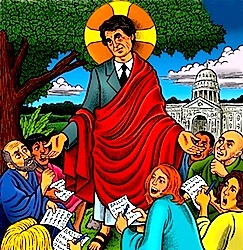
"Rick Perry's a Christian.
He's an evangelical Christian, a follower of Jesus Christ,"
Jeffress said. "Mormonism is not Christianity. It has
always been considered a cult by the mainstream of Christianity."
Jeffress has a lot of influence in the state of Texas. The
evangelical megachurch where he preaches draws more than 10,000
members.
This isn't the first time Jeffress has disparaged the Massachusetts
governor for being Mormon. "Mitt
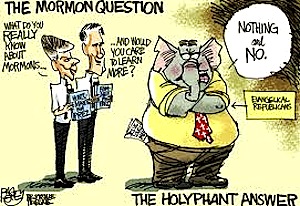 Romney
is a Mormon, and don't let anybody tell you otherwise. Even
though he talks about Jesus as his lord and savior, he is
not a Christian. Mormonism is not Christianity. Mormonism
is a cult. And just because somebody talks about Jesus does
not make them a believer," Jeffress said
in a 2007 sermon. Romney
is a Mormon, and don't let anybody tell you otherwise. Even
though he talks about Jesus as his lord and savior, he is
not a Christian. Mormonism is not Christianity. Mormonism
is a cult. And just because somebody talks about Jesus does
not make them a believer," Jeffress said
in a 2007 sermon.
While Perry's campaign was careful to distance itself from
Jeffress' position, they didn't say they'd turn down his endorsement,
if it is offered.
"The governor does not believe Mormonism is a cult,"
said a campaign spokesman Mark Miner. They initially claimed
that summit organizers were solely responsible for having
Jeffress introduce Perry. Later a Perry spokesman told AP
the campaign agreed to the decision.
"The governor is running a campaign of inclusion and
looks forward to receiving the endorsement of many people.
People can endorse whoever they like," said Miner.
(Full
text)
|
|
Romney
to Speak Before Controversial Figure
By ERIK ECKHOLM
The New York Times: October 5, 2011
Since
Mitt Romney is battling suspicion among Christian conservatives
about the depth 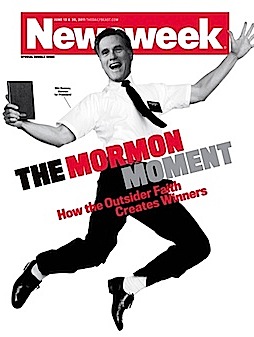 of
his opposition to same-sex marriage and abortion,
it is no surprise that he is joining the other major Republican
candidates this week to speak at the annual Values
Voters Summit, a celebration of the political aims of the
religious right. of
his opposition to same-sex marriage and abortion,
it is no surprise that he is joining the other major Republican
candidates this week to speak at the annual Values
Voters Summit, a celebration of the political aims of the
religious right.
The conference, from Friday to Sunday in Washington, is sponsored
by the Family Research Council, the American Family
Association and other evangelical Christian groups. It aims
to energize social conservatives and test the fidelity of
the candidates.
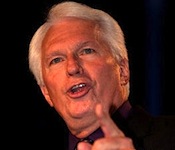 The conference planners have obliged Mr. Romney, scheduling
him to speak right before Bryan Fischer, who is chief
spokesman for the family association and is known for his
strident remarks on homosexuality, gay rights, Muslims and
Mormons. Their talks will be followed by a panel
of same-sex marriage opponents.
The conference planners have obliged Mr. Romney, scheduling
him to speak right before Bryan Fischer, who is chief
spokesman for the family association and is known for his
strident remarks on homosexuality, gay rights, Muslims and
Mormons. Their talks will be followed by a panel
of same-sex marriage opponents.
The liberal advocacy group People for the American
Way has called on the presidential candidates, and especially
Mr. Romney because he will share a stage, to publicly disassociate
themselves from Mr. Fischer and what it called, in a statement
on Wednesday, his “unmitigated bigotry.” The Southern
Poverty Law Center has made similar appeals to the candidates.

The Family Research Council and the American Family Association
have both been labeled “antigay hate groups” by
the law center, a private advocacy organization,
for spreading misinformation about homosexuality. But the
two groups say the charges are politically  motivated
and they are praised by some conservatives for defending Biblical
values. motivated
and they are praised by some conservatives for defending Biblical
values.
Mr. Fischer has stood out for his harsh statements
on his daily radio show, likening gay rights advocates to
domestic terrorists, arguing that gay men and lesbians should
be barred from public office and repeating the discredited
theory that homosexuals built the Nazi Party.
 He has said that American Muslims should be banned from the
military and that Mormons, let alone Muslims,
should not enjoy First Amendment protections because these
are reserved for true Christians.
He has said that American Muslims should be banned from the
military and that Mormons, let alone Muslims,
should not enjoy First Amendment protections because these
are reserved for true Christians.
| |
|
What
goes around, comes around. |
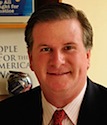 “If
Mitt Romney wants to appeal to mainstream audiences, he should
publicly disassociate himself from Fischer’s bigotry
before handing him the podium,” said Michael
Keegan, president of People for the American
Way. “If
Mitt Romney wants to appeal to mainstream audiences, he should
publicly disassociate himself from Fischer’s bigotry
before handing him the podium,” said Michael
Keegan, president of People for the American
Way.
The Romney campaign did not immediately comment on
the call to distance the candidate from Mr. Fischer.
(Full
text)
Is
Romney's Mormon faith affecting votes?
By Whit Johnson
CBS News: October 8, 2011
Concerns
about Romney's religion have plagued his candidacy
since his previous run for president and prompted
him to deliver a 2007 address about faith in America.
"I believe that Jesus Christ
is the son of god and the savior of mankind," Romney
said from that speech.
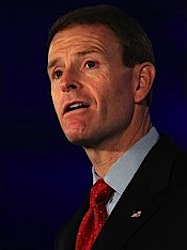 Whit
Johnson (of CBS) asked Tony
Perkins (right)
of the Family
Research Council, which helped organize this
weekend's summit, if Romney is a Christian. Whit
Johnson (of CBS) asked Tony
Perkins (right)
of the Family
Research Council, which helped organize this
weekend's summit, if Romney is a Christian.
"There are theological differences between Mormonism
and Christianity," said Perkins. "Evangelicals
do not see Mormonism as Christianity."
He said that to win over evangelicals, Romney needs to stay
laser-focused on the issues.
"These theological differences have been going on for
generations. You're not going to change that in an election
cycle," said Perkins.
In a CBS News poll out this week, 42 percent of white
evangelicals said most people they know would not vote for
a Mormon. That's bad for Romney, especially considering
evangelicals made up 44 percent of Republican primary voters
in 2008.
Johnson asked Scott Blakeman from Raleigh, North Carolina
if he considered Mormonism is a cult? "
A cult, yes," he replied.
"As a Christian
I would obviously be more comfortable supporting a Christian
with Christian biblical world views."
said Victoria Jakelsky of Flemington, New jersey.
For
Romney, Social Issues Pose New Test
By MICHAEL D. SHEAR, ERIK ECKHOLM and ASHLEY PARKER
The New York Times: October 8, 2011
WASHINGTON
— After years of trying to tamp down concerns about
his stance on social issues and his Mormon faith, Mitt Romney
is now being forced to fend off revived  questions
from rivals and evangelical leaders about the consistency
and depth of his conservatism. questions
from rivals and evangelical leaders about the consistency
and depth of his conservatism.
Mr. Romney has tried at every stage of the race for the Republican
presidential nomination to focus on the economy, and he did
so again on Saturday, when he appeared here at the Values
Voter Summit, a gathering of social conservative activists.
But he also felt compelled to reiterate that he was
in sync with social conservatives as he ran through his positions
on abortion, marriage, judicial appointments and religious
values. And as other speakers condemned homosexuality
and raised questions about whether a Mormon is a true Christian,
Mr. Romney emphasized that tolerance and civility were conservative
values.
Beyond Mr. Romney’s substantive positions, his
faith is re-emerging as a concern among some evangelicals.
On Saturday, a conservative activist speaking after
Mr. Romney, Bryan Fischer, said without naming Mr. Romney
that the next president had to be a man of “genuine”
Christian faith. On Friday, a backer of Mr. Perry described
Mr. Romney’s faith as a cult.
Advisers
said the campaign’s approach in 2012 was based
on a belief that conservative voters and religious leaders
know far more about Mr. Romney’s views than they did
four years ago. They noted that Mr. Romney had attended the
Values Voter Summit conference every year. They said
that there were no plans for him to give another speech about
his Mormon faith but that he would continue to address
social issues as they were raised.
Mr. Romney is also determined to keep his focus on the economic
struggles of voters, believing that is Mr. Obama’s biggest
vulnerability. Some social conservative leaders say
evangelical voters will mobilize behind any Republican nominee,
including Mr. Romney, just because they are so united
in their desire to defeat Mr. Obama.
|
| |
Why
the Antichrist Matters in Politics
By MATTHEW AVERY SUTTON, OP-ED
CONTRIBUTOR
The New York Times: September 25, 2011
Pullman, Wash.-
THE end is near — or so
it seems to a segment of Christians aligned with the religious
right. The global economic meltdown, numerous natural
 disasters
and the threat of radical Islam have fueled a conviction among
some evangelicals that these are the last days. While such
beliefs might be dismissed as the rantings of a small but
vocal minority, apocalyptic fears helped drive the antigovernment
movements of the 1930s and ’40s and could help define
the 2012 presidential campaign as well. disasters
and the threat of radical Islam have fueled a conviction among
some evangelicals that these are the last days. While such
beliefs might be dismissed as the rantings of a small but
vocal minority, apocalyptic fears helped drive the antigovernment
movements of the 1930s and ’40s and could help define
the 2012 presidential campaign as well.
Christian apocalypticism has a long
and varied history. Its most prevalent modern incarnation
took shape a century ago, among the vast network of preachers,
evangelists, Bible-college professors and publishers who established
the fundamentalist movement. Baptists, Methodists, Presbyterians,
Pentecostals and independents, they shared a commitment to
returning the Christian faith to its “fundamentals.”
Biblical criticism, the return of Jews to the Holy Land, evolutionary
science and World War I convinced them that the second coming
of Jesus was imminent. Basing their
predictions on biblical prophecy, they identified signs, drawn
especially from the books of Daniel, Ezekiel and Revelation,
that would foreshadow the arrival of the last days: the
growth of strong central governments and the consolidation
of independent nations into one superstate led by a seemingly
benevolent leader promising world peace.

This
leader would ultimately prove to be the Antichrist,
who, after the so-called rapture of true saints to heaven,
would lead humanity through a great tribulation culminating
in the second coming and Armageddon. Conservative
preachers, evangelists and media personalities of the 20th
century, like Billy Sunday, Aimee Semple McPherson, Billy
Graham and Jerry Falwell, shared these beliefs.
Fundamentalists’ anticipation
of a coming superstate pushed them to the political right.
As the government grew in response to industrialization, fundamentalists
concluded that the rapture was
approaching. Their anxieties worsened in the 1930s
with the rise of fascism. Obsessed with matching biblical
prophecy with current events, they studied Mussolini,
Hitler and Stalin, each of whom seemed to foreshadow the
Antichrist.
President Franklin D. Roosevelt troubled them as well. His
consolidation of power across more than three terms in the
White House, his efforts to undermine the autonomy of the
Supreme Court, his dream of a global United Nations and especially
his rapid expansion of the government confirmed what many
fundamentalists had feared: the United States was lining up
with Europe in preparation for a new world dictator.
As a result, prominent fundamentalists joined right-wing libertarians
in their effort to undermine Roosevelt. That this mix of millennialism
and activism seemed inconsistent — why work for reform
if the world is destined for Armageddon? — never troubled
them. They simply asserted that Jesus had called them to “occupy”
until he returned (Luke 19:13). Like orthodox Marxists who
challenge capitalism even though they say they believe it
represents an inevitable step on the road to the socialist
paradise, conservative Christians never let their conviction
that the future is already written lead them to passivity.
The world in 2011 resembles the world of the 1930s in many
respects. International turmoil and a prolonged economic downturn
have fueled distrust of government, as has the rise of a new
libertarianism represented in the explosive growth of the
Tea Party.
For some evangelicals, President Obama is troubling. The specious
theories about his  place
of birth, his internationalist tendencies, his place
of birth, his internationalist tendencies, his  measured
support for Israel and his Nobel Peace Prize fit their long-held
expectations about the Antichrist. So does his commitment
to expanding the reach of government in areas like health
care. measured
support for Israel and his Nobel Peace Prize fit their long-held
expectations about the Antichrist. So does his commitment
to expanding the reach of government in areas like health
care.
In 2008, the campaign of Senator John
McCain, the Republican nominee, presciently
tapped into evangelicals’ apocalyptic fears by
producing an ad, “The One,”
that sarcastically heralded Mr. Obama as a messiah. Mr. McCain
was onto something. Not since Roosevelt have we had
a president of charisma and global popularity, who so perfectly
fits the evangelicals’ Antichrist mold.
While Depression-era fundamentalists
represented only a small voice among the anti-Roosevelt forces
of the 1930s, evangelicals have grown ever savvier and
now constitute one of the largest interest groups in the Republican
Party. In the past, relatively responsible leaders
like Mr. Graham, who worked with Presidents Lyndon B. Johnson
and Richard M. Nixon, and even Mr. Falwell, who reined in
evangelical excess in exchange for access to the Reagan White
House, channeled their evangelical energy.
Not now. A leadership vacuum exists
on the evangelical right that some Republicans — Rick
Perry, Michele Bachmann and even Ron Paul — are
exploiting. How tightly their strident anti-statism
will connect with evangelical apocalypticism remains to be
seen.
The left is in disarray while libertarianism
is on the ascent. A new generation of evangelicals
— well-versed in organizing but lacking moderating influences
— is lining up behind hard-right anti-statists. While
few of the faithful truly think that the president is the
Antichrist, millions of voters, like their Depression-era
predecessors, fear that the time is
short. The sentiment that Mr. Obama
is preparing the United States, as Roosevelt did, for
the Antichrist’s global coalition is likely 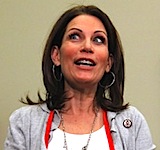 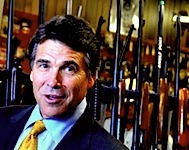 to
grow. to
grow.
Barring the rapture, Mrs. Bachmann
or Mr. Perry could well ride the apocalyptic
anti-statism of conservative Christians into the Oval Office.
Indeed,
the tribulation may be upon us.
Matthew
Avery Sutton, an associate professor of history at
Washington State University, is the author of “Aimee
Semple McPherson and the Resurrection of Christian America.”
(Full
text)
|

GAIL
COLLINS
|
And
the Good News Is ...
By GAIL COLLINS, OP-ED COLUMNIST
The New York Times: September 10, 2011
Finally,
we’re coming to a consensus about what’s wrong
with the economy. It’s us. And our
bad attitude.
I think there’s another opening here for citizen involvement.
If the problem is attitude, declare
war on the national funk. Every time you hear a depressing
piece of news, come back with something
cheerful.
 Some viewers of this week’s Republican
debate found it depressing that Rick
Perry, who has referred to evolution
as “a theory that’s out there” also
did not seem to believe in climate change,
and appeared to be under the impression that Galileo
was persecuted for his belief in the earth revolving around
the sun by his fellow scientists, rather than the religious
establishment (at right before the Inquisition).
Some viewers of this week’s Republican
debate found it depressing that Rick
Perry, who has referred to evolution
as “a theory that’s out there” also
did not seem to believe in climate change,
and appeared to be under the impression that Galileo
was persecuted for his belief in the earth revolving around
the sun by his fellow scientists, rather than the religious
establishment (at right before the Inquisition).
However, it did give us a welcome chance for a national discussion
about Galileo, who does not get mentioned nearly enough.
Go through any issue of the paper and you’ll find positive
stories you can share with  your
friends, possibly over a glass of merlot and a Hershey bar.
In South Africa, there’s word
at the University of the Witwatersrand
of an important new fossil discovery (Australopithecus
sediba, left). Nicholas
Wade reported in The
Times that “the bones are especially well preserved
because their owners apparently fell into a deep cave and
a few weeks later were swept into sediment that quickly your
friends, possibly over a glass of merlot and a Hershey bar.
In South Africa, there’s word
at the University of the Witwatersrand
of an important new fossil discovery (Australopithecus
sediba, left). Nicholas
Wade reported in The
Times that “the bones are especially well preserved
because their owners apparently fell into a deep cave and
a few weeks later were swept into sediment that quickly 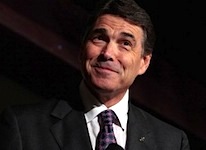 fossilized
their bones.” Focus on the scientific aspects of this
development while glossing over the fact that for an increasing
number of American college graduates now working on their
fourth unpaid internship, falling into a deep cave and becoming
fossilized may begin to sound like a good career plan. fossilized
their bones.” Focus on the scientific aspects of this
development while glossing over the fact that for an increasing
number of American college graduates now working on their
fourth unpaid internship, falling into a deep cave and becoming
fossilized may begin to sound like a good career plan.
Those bones are estimated to be about
2 million years old.
Perhaps
better not to mention that to Rick Perry.
|
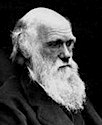
CHARLES
DARWIN
|
Called
Anti-Science, Rightbloggers Reply That Science is a Liberal
Plot
By Roy Edroso
The Village Voice: Mon., Sep. 5 2011
With
the ascension of Rick Perry, Michele Bachmann,
Rick Santorum, and other GOP

 cadidates
who don't cotton to this evolution
or climate change stuff, people
have begun to ask if Republicans and conservatives
are actually becoming hostile to science. It doesn't
help that one of those people is Republican Presidential candidate
John Huntsman. cadidates
who don't cotton to this evolution
or climate change stuff, people
have begun to ask if Republicans and conservatives
are actually becoming hostile to science. It doesn't
help that one of those people is Republican Presidential candidate
John Huntsman.
Rightbloggers leapt
into this fray with a broad reinterpretation
of the word "science" to mean whatever they
wanted it to mean, which in most cases
was "something liberals and scientists use to attack God
and America."
A few weeks back Huntsman
worried aloud that Republicans increasingly "find
ourselves on the wrong side of science, and, therefore, in a
losing position." He was seconded by such
expected sources as Paul Krugman.
But less ideologically-oriented publications jumped in as well:
Last week the science magazine Discover,
for example, wondered about "the
increasingly antiscience Republican candidates."
Some people who are decidedly not liberals got nervous about
it too. At libertarian magazine Reason,
Steve Chapman wrote about "The
Conservative Reversal on Science."
Bernard Goldberg said this
week, "Liberal Democrats may be nuts,
but they're not nuts about this kind of thing. A conservative
running for the GOP nomination for president may do quite well
in Iowa believing in religious fairy tales - but it's not going
to play well in other parts of the country, especially with
independents who tend to be more moderate."
The brethren put on their thinking caps and came up some zingers
to shut up them science-y liberal types.
"In no sense that the ordinary person
would understand the term is Rick Perry 'anti-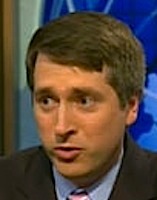 science,'"
asserted National Review's Rich Lowry
(right).
"He hasn't criticized the scientific
method, or sent the Texas Rangers to chase out from the state
anyone in a white lab coat." science,'"
asserted National Review's Rich Lowry
(right).
"He hasn't criticized the scientific
method, or sent the Texas Rangers to chase out from the state
anyone in a white lab coat."
In fact, said Lowry, "Perry's
website touts his Emerging Technology Fund as an effort to bring
'the best scientists and researchers to Texas.'"
As if that weren't convincing enough, he also pointed out that
Perry's home state "has
a booming health-care sector," which proves Perry's
devotion to science much as Texas' record drought might prove
his devotion to dehydration.
Lowry admitted Perry has a "somewhat
doubtful take on evolution," but explained
that it "has more to do with a general
impulse to preserve a role for God in
 creation
than a careful evaluation of the work of, say, Stephen Jay Gould."
Also, lots
of Americans don't think man came from no monkey, neither.
So Perry has great motives for his anti-evolution stand: God,
and possible election to the Presidency. creation
than a careful evaluation of the work of, say, Stephen Jay Gould."
Also, lots
of Americans don't think man came from no monkey, neither.
So Perry has great motives for his anti-evolution stand: God,
and possible election to the Presidency.
By contrast, said Lowry, liberals only
believe in evolution because they hate God. "Science is
often just an adjunct to the Left's faith commitments,"
he wrote. "A Richard
Dawkins (left) takes evolutionary science beyond its
competence and argues that it dictates atheism... They
are believers wrapping themselves in the rhetoric of science
while lacking all the care and dispassionate reasoning we associate
with the practice of it."
Scientists, huh? Rich Lowry will tell them what science is! |

IRENE
|
Bachmann
Links God, Disasters and Politics
By SARAH WHEATON and TRIP GABRIEL
The New York Times: August 29, 2011
As
municipal crews around the Northeast worked to clean up after
Hurricane Irene,  Representative
Michele Bachmann did her own damage control after she
used a Florida political rally to suggest that the
recent natural disasters were God’s way of sending a
message to Washington. Representative
Michele Bachmann did her own damage control after she
used a Florida political rally to suggest that the
recent natural disasters were God’s way of sending a
message to Washington.
“I don’t know how much God
has to do to get the attention of the politicians,”
she told a group of generally older residents on Florida’s
Gulf Coast on Sunday, referring to the need to rein in spending.
“We’ve had an earthquake;
we’ve had a hurricane. He said: ‘Are you going
to start listening to me here? Listen to the American people
because the American people are roaring right now.’
”
Mrs. Bachmann’s comments came
less than a week after a 5.8-magnitude earthquake near  Mineral,
Va., shook a large stretch of the East Coast, including Washington
and New York — areas that would have to brace for a
hurricane days later. Irene,
as both a hurricane and tropical storm, knocked
out power for more than a million people and left nearly 30
dead, according to The Associated
Press’s latest count. Mineral,
Va., shook a large stretch of the East Coast, including Washington
and New York — areas that would have to brace for a
hurricane days later. Irene,
as both a hurricane and tropical storm, knocked
out power for more than a million people and left nearly 30
dead, according to The Associated
Press’s latest count.
When a reporter asked her about the remarks after the event
in Sarasota, Mrs. Bachmann was quick to play down her intentions.
“Our hearts and prayers go out to the families of the
victims,” she said. “This isn’t something
that we take lightly. My comments were not meant to be ones
that were taken lightly. What I was saying in a humorous vein
is there are things happening that politicians need to pay
attention to. It isn’t every day we have an earthquake
in the United States.”
She continued: “I think what we’re seeing in this
country is we have to have a margin financially. We are so
out over the cliff financially, we don’t have the margin
we need anymore.”

Mrs. Bachmann, whose Florida visit was extended an extra day
after the storm disrupted her travel plans, repeated at a
Cuban-American restaurant in Miami on Monday that she did
not mean for her remark to be taken seriously. “Of course
it would be absurd and ridiculous to think that would be the
intent of my comment,” she said in response to a reporter’s
question. “If you know me, I am a person who loves humor.
I have a great sense of humor. I think it’s important
to exhibit that humor sometimes when you’re talking
to people as well.
(Full
text)
|

PAUL
KRUGMAN
|
Republicans
Against Science
By PAUL KRUGMAN, OP-ED COLUMNIST
The New York Times: August 28, 2011
Jon
Huntsman Jr., a former Utah governor and ambassador to China,
isn’t a serious  contender
for the Republican presidential nomination. And that’s
too bad, because Mr. Hunstman has been
willing to say the unsayable about the G.O.P. —
namely, that it is becoming the “anti-science
party.” This is an enormously important development. contender
for the Republican presidential nomination. And that’s
too bad, because Mr. Hunstman has been
willing to say the unsayable about the G.O.P. —
namely, that it is becoming the “anti-science
party.” This is an enormously important development.
And
it should terrify us.
To
see what Mr. Huntsman means, consider recent statements by
the two men who actually are serious contenders for the G.O.P.
nomination: Rick Perry and Mitt Romney.
Mr. Perry, the
governor of Texas, recently made headlines by dismissing
evolution as  “just
a theory,” one that has
“got some gaps in it”
— an observation that will come as news to the vast
majority of biologists. But what really got people's attention
was what he said about climate change:
“I think there are a substantial
number of scientists who have manipulated data so that they
will have dollars rolling into their projects. And I think
we are seeing almost weekly, or even daily, scientists are
coming forward and questioning the original idea that man-made
global warming is what is causing the climate to change.” “just
a theory,” one that has
“got some gaps in it”
— an observation that will come as news to the vast
majority of biologists. But what really got people's attention
was what he said about climate change:
“I think there are a substantial
number of scientists who have manipulated data so that they
will have dollars rolling into their projects. And I think
we are seeing almost weekly, or even daily, scientists are
coming forward and questioning the original idea that man-made
global warming is what is causing the climate to change.”
That’s a remarkable statement
— or maybe the right adjective is “vile.”
The second part of Mr. Perry’s
statement is, as it happens, just false:
the scientific consensus about man-made global warming —
which includes 97 percent to 98 percent of researchers in
the field, according to the National Academy of Sciences —
is getting stronger, not weaker, as
the evidence for climate change just
keeps mounting.
Mr. Perry suggests; those
scientists are just in it for the money, “manipulating
data” to create a fake threat. In his book “Fed
Up,” he dismissed climate science
as a “contrived phony mess that
is falling apart.”
Mr. Perry and those who think like him know
what they want to believe, and their response to anyone
who contradicts them is to start a witch
hunt.
So how has Mr. Romney, the other leading
contender for the G.O.P. nomination, 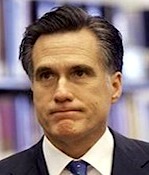 responded
to Mr. Perry’s challenge? In trademark fashion:
By running away. In the past,
Mr. Romney, a former governor of Massachusetts, has strongly
endorsed the notion that man-made climate change is a real
concern. But, last week, he softened that to a statement that
he thinks the world is getting hotter,
but “I don’t know that”
and “I don’t know if it’s
mostly caused by humans.” responded
to Mr. Perry’s challenge? In trademark fashion:
By running away. In the past,
Mr. Romney, a former governor of Massachusetts, has strongly
endorsed the notion that man-made climate change is a real
concern. But, last week, he softened that to a statement that
he thinks the world is getting hotter,
but “I don’t know that”
and “I don’t know if it’s
mostly caused by humans.”
Moral
courage!
Of course, we know what’s motivating
Mr. Romney’s sudden lack of conviction. According
to Public Policy Polling,
only 21 percent
of Republican voters in Iowa believe in global warming (and
only 35 percent believe in evolution).
Within the G.O.P.,
willful ignorance has become a litmus test for candidates,
one that Mr. Romney is determined to pass at all costs.
|
|
Crashing
the Tea Party
By DAVID E. CAMPBELL and ROBERT D. PUTNAM - OP-ED CONTRIBUTORS
The New York Times: August 17, 2011
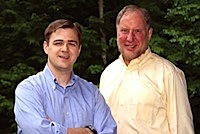 GIVEN
how much sway the Tea Party has among Republicans in Congress
and those seeking the Republican presidential nomination,
one might think the Tea Party
is redefining mainstream American politics. GIVEN
how much sway the Tea Party has among Republicans in Congress
and those seeking the Republican presidential nomination,
one might think the Tea Party
is redefining mainstream American politics.
But in fact the Tea
Party is increasingly swimming against the tide of
public opinion: among most Americans, even before the
furor over the debt limit, its brand was becoming toxic. To
embrace the Tea Party carries great political risk for Republicans,
but perhaps not for the reason you might think.
Of course, politicians of all stripes are not faring well
among the public these days. But in data we have recently
collected, the Tea Party ranks lower
than any of the 23 other groups we asked about —
lower than both Republicans and Democrats.
It is even less popular than
much maligned groups like “atheists”
and “Muslims.”
Interestingly, one group that approaches it in unpopularity
is the Christian Right.
...what do Tea Partiers have in common?
They are overwhelmingly white, but even compared to other
white Republicans, they had a low regard for immigrants and
blacks long before Barack Obama was president, and they still
do.
More important, they were disproportionately
social conservatives in 2006
— opposing abortion, for example — and still are
today. Next to being a Republican,
the strongest predictor of being a Tea
Party supporter today was a desire,
back in 2006, to see religion play a
prominent role in politics. And
Tea Partiers continue to hold these views: they
seek “deeply religious” elected officials, approve
of religious leaders’ engaging in politics and want
religion brought into political debates. The
Tea Party’s generals may say their overriding concern
is a smaller government, but not their
rank and file, who are more concerned about putting God in
government.
  This
inclination among the Tea Party faithful
to mix religion and politics explains their support
for Representative Michele Bachmann
of Minnesota and Gov. Rick Perry of
Texas. Their appeal to Tea Partiers lies less in what
they say about the budget or taxes, and
more in their overt use of religious language and imagery,
including Mrs. Bachmann’s lengthy prayers at campaign
stops and Mr. Perry’s prayer rally in Houston. This
inclination among the Tea Party faithful
to mix religion and politics explains their support
for Representative Michele Bachmann
of Minnesota and Gov. Rick Perry of
Texas. Their appeal to Tea Partiers lies less in what
they say about the budget or taxes, and
more in their overt use of religious language and imagery,
including Mrs. Bachmann’s lengthy prayers at campaign
stops and Mr. Perry’s prayer rally in Houston.
Yet it is precisely this infusion of
religion into politics that most Americans increasingly oppose.
While over the last five years Americans
have become slightly more conservative economically, they
have swung even further in opposition to mingling religion
and politics. It thus makes sense that the
Tea Party ranks alongside the Christian
Right in unpopularity.
|
 Wouldn't
it be nice?
Wouldn't
it be nice? |
George
W. Bush knockoff Rick Perry joins Michele Bachmann among GOP
pretenders
MIKE LUPICA
New York Daily News: Monday, August 15th 2011
So
here comes the second coming of George
W. Bush out of the governor's mansion in  Texas,
Rick (Dubya) Perry. Texas,
Rick (Dubya) Perry.
Or maybe just call him W2.
Perry is taller, has much better hair, seems to believe
he has an even better pipeline to God than Bush did.
And he comes out of Paint Creek, Tex., different from the
Texas town that gave us Bush, the one we also know as Yale
University.
Whether Dubya
Perry is holier than Michele Bachmann, the new President
of Ames, Iowa, remains to be seen. For now, though,
Perry and Bachmann are the headliners of the moment in the
Republican Party. Barack
Obama must be rooting like crazy for both of them,
at the beginning of a campaign where fringe
Republicans might do a better job of saving Obama than he
can of saving himself.
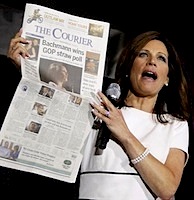
Perry is the latest guy in the race, announcing Saturday in
South Carolina, not throwing his hat into the race as much
as his helmet hair. This was the day after Bachmann,
who really does think she can out-God
Perry and everybody else in the race, wins a straw
poll in Iowa with about 4,000 votes, which is a couple of
blocks in New York City.
Yet there was Bachmann talking herself up big, answering questions
about Dubya Perry, as if he is her main competition just by
showing up. Of course they both genuflect
in front of the Tea Party and the religious right,
all those who cheer as Bachmann
talks about "taking back the country"
from Obama, and act as if gay
marriage is more of a threat than the Taliban.
|
|
Pawlenty
Courts Evangelicals in Make-or-Break Moment
By MICHAEL D. SHEAR
The New York Times: August 9, 2011
CLIVE, Iowa — For the small gathering
of Iowa faith leaders, Tim
Pawlenty offered a 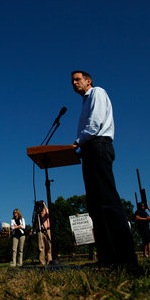 mix
of religion and get-it-done realism. mix
of religion and get-it-done realism.
“The privileges, the liberties, the freedoms, the blessings
that we 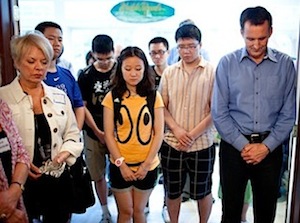 enjoy,
come from our creator, God,” Mr. Pawlenty, the
former governor of Minnesota, said on Monday night. “We
want a candidate to emerge in this race who I think understands
not just the values, not just the issues, but also the commitment
to get it done.” enjoy,
come from our creator, God,” Mr. Pawlenty, the
former governor of Minnesota, said on Monday night. “We
want a candidate to emerge in this race who I think understands
not just the values, not just the issues, but also the commitment
to get it done.”
As he heads toward what could be a make-or-break moment for
his presidential campaign this weekend,
Mr. Pawlenty, who has lagged in polls and fund-raising,
is not giving up on the evangelical
voters who are so often the cornerstone of Republican
victories here.
His outreach to religious voters, as
well as to home-school advocates and opponents of same-sex
marriage, is part of an urgent try-everything, try-anything
strategy that his advisers hope will lead to a better-than-expected
showing in the Iowa Straw Poll on Saturday
On Tuesday morning, Mr. Pawlenty was
the lone Republican presidential candidate to help kick off
a 22-county tour of Iowa by the Value
Voter Bus, thanking the evangelical
activists sponsoring the trip for “standing
for a culture of life.” He has started a Web
site, Pawlentyfaith.com. And
in between stops on the bus, he is meeting
privately with the state’s religious leaders.


Representative
Michele Bachmann (right) of Minnesota is courting the
same voters and does so with gusto. At an event Sunday,
she offered a long prayer for the military personnel who died
in a helicopter crash in Afghanistan over the weekend.
Bob Vander Plaats
(left), the head of Iowa Family Leader,
an influential faith group, said Mrs.
Bachmann
“has
a certain pizazz
about her.”
|

As
the howls of superstition and ignorance grow louder, the voice
of reason and sanity must rise.
SILENCE
is DEATH.

|
Perry
Leads Prayer Rally for ‘Nation
in Crisis’
By MANNY FERNANDEZ
The Nerw York Times: August 6, 2011

MADONNO
AND CHILD
IN THE GARDEN OF HEATHEN
to
RICK
PERRY, DONALD WILDMON & MOB
In Response to the Response
on
6 August 2011
HIROSHIMA DAY
Commemorating the Greatest Single Atrocity
against Humanity in the History of Man
 PRAY! PRAY!
"When
fascism comes to America it will be wrapped in a flag
and carrying a cross."
~
SINCLAIR LEWIS
|
HOUSTON
— Standing on a stage surrounded by thousands
of fellow Christians on Saturday morning, Gov.
Rick Perry of Texas called on Jesus to bless
and guide the nation’s military and political
leaders and “those who cannot see the
light in the midst of all the darkness.”
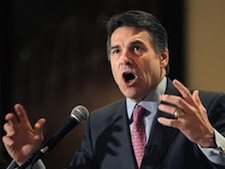
“Lord, you are the
source of every good thing,” Mr.
Perry said,
as he bowed his head, closed his eyes and leaned
into a microphone at Reliant Stadium here.
“You are our only hope, and we stand before
you today in awe of your power and in gratitude
for your blessings, and humility for our sins.
Father, our heart breaks for America. We see
discord at home. We see fear in the marketplace.
We see anger in the halls of government, and
as a nation we have forgotten who made us, who
protects us, who blesses us, and for that we
cry out for your forgiveness.”
In a 13-minute address, Mr.
Perry read several passages from the Bible during
a prayer rally he sponsored. Thousands
of people stood or kneeled in the aisles or
on the concrete floor in front of the stage,
some wiping away tears and some shouting, “Amen!”
The event opens him up to criticism for mixing
religion and politics in such a grand and overtly
Christian fashion.
|
|
|
|
|
|
|
In
many ways, the rally was unprecedented, even in Texas, where
faith and politics have long intersected without much controversy
— the governor, as both a private
citizen and an elected leader,
delivering a message to the Lord
at a Christian prayer rally he
created, while using his office’s
prestige, letterhead, Web site and other resources to promote
it. Mr. Perry said he wanted people of all faiths
to attend, but Christianity dominated the service and the
religious affiliations of the crowd. The
prayers were given in Jesus Christ’s name, and the many
musical performers sang of Christian themes of repentance
and salvation.
Mr. Perry addressed the crowd nine days after a federal judge
dismissed a lawsuit 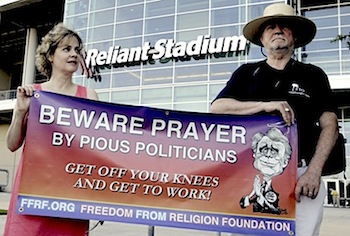 filed
against him by a national group of atheists arguing that his
participation in the rally in his official capacity as governor
violated the First Amendment’s
requirement of separation of church and state. filed
against him by a national group of atheists arguing that his
participation in the rally in his official capacity as governor
violated the First Amendment’s
requirement of separation of church and state.
Members and supporters of that group, the Wisconsin-based
Freedom From Religion Foundation,
were among dozens of people protesting outside the stadium.
Others included gay
activists who criticized Mr. Perry for supporting the
American Family Association,
which organized and financed the
rally. The association is a conservative
evangelical group based in Mississippi that is listed
as an antigay hate group by the nonprofit Southern
Poverty Law Center.
|
|
With
Rally, Christian Group Asserts Its Presence in ’12 Race
By ERIK ECKHOLM
The New York Times: August 4, 2011
TUPELO, Miss. — To its admirers on the religious right,
the American Family Association is
a stalwart leader in a last-ditch fight to save America’s
Christian culture and the values of traditional families.
To its liberal critics, it
is a shrill, even hateful voice of intolerance, out to censor
the arts, declare Muslims unfit for public office and deny
equality to gay men and lesbians because they engage in sinful
“aberrant sexual behavior.”
Broadcast on its 192 talk-radio stations, streamed over the
Internet and e-mailed in “action
alerts” to 2.3 million potential voters, the
American Family Association’s pronouncements
have flowed forth daily from its sleek offices here in the
Deep South.
But now it is doing more than preaching
to the choir. This summer, the
association has thrust itself into presidential politics by
paying for and organizing a day of prayer
to save “a nation in crisis”
that Gov. Rick Perry (left) of
 Texas
is convening this Saturday. Several
Republican presidential aspirants, including Michele
Bachmann, Newt Gingrich and Tim Pawlenty, have appeared
on a radio program on the group’s
American Family network. Texas
is convening this Saturday. Several
Republican presidential aspirants, including Michele
Bachmann, Newt Gingrich and Tim Pawlenty, have appeared
on a radio program on the group’s
American Family network.
The rally, at a stadium in Houston, is expected to draw dozens
of the country’s most conservative evangelical groups
and leaders, and could burnish Mr. Perry’s national
profile and his appeal to religious conservatives as he considers
entering the 2012 presidential race.
Mr. Perry invited his fellow governors
but only one, Sam Brownback of Kansas,
also a Republican, accepted the invitation to the explicitly
Christian rally, and in recent days even his
attendance appeared uncertain, with his staff stressing that
if Mr. Brownback went, it would be in a private, not an official,
capacity.
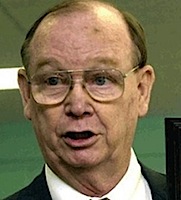 “It’s
a plea to God to help our country,” Donald
E. Wildmon, the family association’s founder
and chairman emeritus, said of the rally, which he, like Mr.
Perry, calls a nonpolitical appeal to God. “It’s
a plea to God to help our country,” Donald
E. Wildmon, the family association’s founder
and chairman emeritus, said of the rally, which he, like Mr.
Perry, calls a nonpolitical appeal to God.
“We’re at a crossroads,”
Mr. Wildmon added in an interview in the association’s
headquarters here about his decades in the culture
wars, which he acknowledges have not always gone his
way. “Either we’re going
to maintain a society based on Judeo-Christian values, or
we’ll have one based on whatever is popular at the moment.”
The association has sharpened its edge over the years, moving
from its well-known crusades for public
“decency” to harshly opposing what it calls
an anti-Christian “homosexual
agenda” — not only same-sex marriage and the acceptance
of gay troops in the military, but any
suggestion that homosexual “behavior is normal.”
The association also campaigns
against antibullying programs that teach tolerance
and corporations (like Home
Depot, a current target) that support gay
pride parades.
Mr. Wildmon warns that if current
social trends go unchecked, “homosexuals
will become part of an elite class” and “Christians
will be second-class citizens at best.”
Mr. Wildmon, 73, has turned over management of the association
to his son Tim Wildmon, 48, but
the group’s reputation for inflammatory
statements rose after 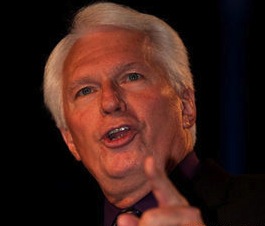 the
hiring two years ago of Bryan
Fischer, a former pastor from
Idaho, as the director of “issues
analysis” and the host of a daily two-hour
afternoon show. Mr. Fischer, 60, silver-haired and a talk-radio
natural, has become a public face of the group. the
hiring two years ago of Bryan
Fischer, a former pastor from
Idaho, as the director of “issues
analysis” and the host of a daily two-hour
afternoon show. Mr. Fischer, 60, silver-haired and a talk-radio
natural, has become a public face of the group.
Perhaps most notably, Mr. Fischer trumpets
the disputed theory that Adolph Hitler
was a homosexual and that the Nazi Party was largely created
by “homosexual thugs” — evidence, he says,
of the inherent pathologies of homosexuality. Mr. Fischer
has also said that no more Muslims should
be granted citizenship because their religion says to kill
Americans, and that welfare recipients
“rut like rabbits” because of what he calls
welfare’s perverse incentives.
“I don’t think we are exaggerating
the dangers to the country, the culture, the American family,”
Mr. Fischer said in an interview. “The
stakes are as high as   they
could be.” they
could be.”
"When
fascism comes to America it will be wrapped in a flag and
carrying a cross."
~
SINCLAIR LEWIS
|
|
Judge
Dismisses Atheists’ Suit Against Texas Governor’s
Prayer Rally
By MANNY FERNANDEZ
The New York Times: July 29, 2011
HOUSTON
— A federal judge on Thursday dismissed a lawsuit filed
against Gov. Rick Perry of Texas by a national group of atheists
seeking to block his participation in and promotion of a Christian-centered
prayer rally next weekend.
The lawsuit, filed this month by the Wisconsin-based Freedom
From Religion  Foundation,
asked the judge to declare Mr. Perry’s involvement in
the event unconstitutional. In a separate
motion filed earlier this week, the group’s lawyers
sought immediately to stop Mr. Perry,
who is contemplating a presidential bid, from either
taking part in the rally or promoting it in
his official capacity as governor, arguing that
doing so violates the First Amendment’s requirement
of separation of church and state. Foundation,
asked the judge to declare Mr. Perry’s involvement in
the event unconstitutional. In a separate
motion filed earlier this week, the group’s lawyers
sought immediately to stop Mr. Perry,
who is contemplating a presidential bid, from either
taking part in the rally or promoting it in
his official capacity as governor, arguing that
doing so violates the First Amendment’s requirement
of separation of church and state.
Judge Gray H.
Miller, of Federal District Court in the Southern District
of   Texas,
ruled that the plaintiffs — the foundation and five
of its Houston-area members — had suffered no concrete
injury and that the governor’s invitations for Texans
to join him in a day of prayer were “requests, not commands.”
People offended by the governor’s prayer rally
can either not attend, not pray or express their disapproval
using their First Amendment rights, the judge said. He
dismissed the lawsuit and the motion
to stop the governor’s official participation. Texas,
ruled that the plaintiffs — the foundation and five
of its Houston-area members — had suffered no concrete
injury and that the governor’s invitations for Texans
to join him in a day of prayer were “requests, not commands.”
People offended by the governor’s prayer rally
can either not attend, not pray or express their disapproval
using their First Amendment rights, the judge said. He
dismissed the lawsuit and the motion
to stop the governor’s official participation.
The judge’s ruling handed Mr. Perry a key legal victory
in what has become one of the most controversial events of
his political career in Texas.
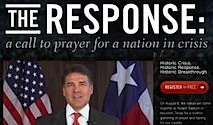 Mr.
Perry announced last month that he was inviting governors
and people from across the country to join him on Aug. 6 in
a day of prayer and fasting at
Reliant Stadium in Houston to “seek
God’s guidance and wisdom in addressing the challenges
that face our communities, states and nation.”
The event, called “The Mr.
Perry announced last month that he was inviting governors
and people from across the country to join him on Aug. 6 in
a day of prayer and fasting at
Reliant Stadium in Houston to “seek
God’s guidance and wisdom in addressing the challenges
that face our communities, states and nation.”
The event, called “The  Response,”
has been described by the governor’s
aides as a nondenominational and apolitical
Christian prayer meeting. Response,”
has been described by the governor’s
aides as a nondenominational and apolitical
Christian prayer meeting.
Even in Texas, where Christian values
and prayer have long been an accepted part of local and state
politics, the governor’s event
has drawn criticism from both Republicans and Democrats, as
well as Jewish groups and civil liberties organizations.
The American Civil Liberties Union of
Texas has asked the governor
and other local and state officials to disclose the amount
of taxpayer dollars and government resources being used to
promote the prayer service. Beyond their concerns that
Mr. Perry is blurring the line between
church and state, his critics say he is pandering
to the religious right as he prepares for his possible presidential
run.
|
|
Herman
Cain’s Bigotry
EDITORIAL
The New York Times: July 25, 2011
Among
a dreary Republican field,
Herman Cain stands out for using religious
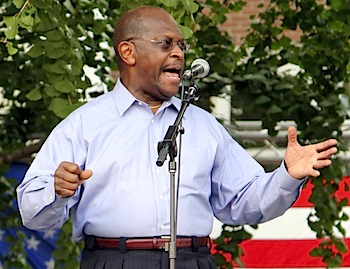 bigotry
to gain political traction for his presidential ambitions. bigotry
to gain political traction for his presidential ambitions.
 Mr.
Cain, a former pizza executive, started a few months ago by
telling a reporter that he would not
be comfortable with a Muslim in his cabinet. During
a televised debate last month, he said his discomfort was
due to the intention of some Muslims
“to kill us.” Mr.
Cain, a former pizza executive, started a few months ago by
telling a reporter that he would not
be comfortable with a Muslim in his cabinet. During
a televised debate last month, he said his discomfort was
due to the intention of some Muslims
“to kill us.”
He quickly moved from that offensive
and absurd generalization to advocating
an overt violation of the Constitution. He
traveled to Murfreesboro, Tenn.,
this month to make common cause with residents who are
protesting the construction of an Islamic
center there. The center, he said, is
not “an innocent mosque,” because, he claimed,
its supporters are trying to sneak Shariah
law into American law.
He told Fox
News that any community has the
right to ban a mosque, because “Islam
is both a religion and a set of laws, Shariah law,”
he said. “That’s
the difference between any one of our other traditional religions
where it’s just about religious purposes.”
Of course, Catholicism, Judaism, and
many other faiths are structured around religious laws. Shariah
law, like those laws, pose no danger to the American legal
system.
Whether Mr. Cain believes his own nonsense or not, it has
won him name recognition. Although no one considers him a
real prospect to win the Republican nomination, he is doing
better in several polls than Tim Pawlenty, Jon Huntsman or
Rick Santorum.
That may explain why the other candidates have yet to condemn
his malice. The field that so
reveres the original intent of the Constitution has yet to
point out that Mr. Cain would violate the plain meaning of
the First Amendment with his mosque ban.
Other Republican candidates would rather criticize Michele
Bachmann for her 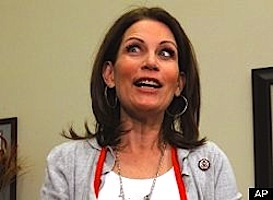  migraine
headaches than repudiate her statements in 2004 that
homosexuality is “personal bondage,
personal despair and personal enslavement.” She
and Mr. Santorum felt free to
sign a pledge likening same-sex marriage
to polygamy and polyandry, which not coincidentally referred
to Shariah law as an “anti-human-rights form of totalitarian
control.” migraine
headaches than repudiate her statements in 2004 that
homosexuality is “personal bondage,
personal despair and personal enslavement.” She
and Mr. Santorum felt free to
sign a pledge likening same-sex marriage
to polygamy and polyandry, which not coincidentally referred
to Shariah law as an “anti-human-rights form of totalitarian
control.”
So many Republican politicians, in Congress
and on the trail, now feel free to say and do shocking things
with regard to the economy and government that they have begun
to blur together. But there are
very few positions more repugnant than advocating
intolerance
(Full
text)
|


BACHMANN

CAIN

GINGRICH

PAUL

PAWLENTY

ROMNEY

SANTORUM
|
Signing
Away the Right to Govern
EDITORIAL
The New York Times: July 19, 2011
It
used to be that a sworn oath to preserve, protect and defend
the Constitution was the only promise required to become president.
But that no longer seems to be enough for a growing number
of Republican interest groups, who are demanding that presidential
candidates sign pledges shackling them to the corners of conservative
ideology. Many candidates are
going along, and each pledge they sign undermines the basic
principle of democratic government built on compromise and
negotiation.
Both parties have long had litmus tests
on issues — abortion, taxation, the environment, the
social safety net. The hope was
that the candidates would keep their promises, and, when they
didn’t, voters who cared deeply about those issues could
always pick someone else next time. Human beings, after all,
do not come with warranties.
 But iron-clad promises were just what the most rigid Republican
ideologues
But iron-clad promises were just what the most rigid Republican
ideologues 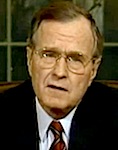 wanted.
They had seen too many presidents —
specifically Ronald Reagan and
George H. W. Bush — bend
when confronted by a complex national reality. Washington,
the ideologues decided,
corrupted true conservatives into moderates. wanted.
They had seen too many presidents —
specifically Ronald Reagan and
George H. W. Bush — bend
when confronted by a complex national reality. Washington,
the ideologues decided,
corrupted true conservatives into moderates.
More was needed to keep them in line,
which gave birth to the signed pledge — no more enforceable
than a spoken promise, but a politician’s
actual signature was seen as more binding.
That
pledge is the single biggest reason the federal government
is now on the
edge
of default. Its signers will not allow revenues in a deal
to raise the debt ceiling.
Its success has now spawned dangerous
offspring. There is the Susan
B. Anthony  pledge,
in which candidates promise to appoint
antiabortion cabinet officers and cut off federal financing
to Planned Parenthood and other abortion providers.
It has been signed by Michele Bachmann,
Newt Gingrich, Ron Paul, Tim Pawlenty and Rick Santorum.
There is the cut, cap and balance pledge
to gut the federal government by cutting and capping spending,
and enacting a balanced-budget amendment to the Constitution. pledge,
in which candidates promise to appoint
antiabortion cabinet officers and cut off federal financing
to Planned Parenthood and other abortion providers.
It has been signed by Michele Bachmann,
Newt Gingrich, Ron Paul, Tim Pawlenty and Rick Santorum.
There is the cut, cap and balance pledge
to gut the federal government by cutting and capping spending,
and enacting a balanced-budget amendment to the Constitution.
 It
has been signed by all of the above candidates, plus Mitt
Romney and Herman Cain. It
has been signed by all of the above candidates, plus Mitt
Romney and Herman Cain.
And there is the particularly bizarre
Marriage Vow, in which candidates agree
to oppose same-sex marriage, reject
Shariah law and pledge personal fidelity to their spouse.
Until it was changed after a
public outcry, it also contained a 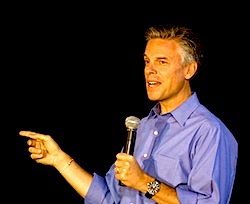 line
saying that a black child born into slavery in 1860 was more
likely to be raised by a two-parent family than a similar
child raised in the Obama era.
It was signed by Mr. Santorum and Mrs. Bachmann. line
saying that a black child born into slavery in 1860 was more
likely to be raised by a two-parent family than a similar
child raised in the Obama era.
It was signed by Mr. Santorum and Mrs. Bachmann.
Only one candidate,
Jon Huntsman Jr.(right), has refused to sign any pledge,
saying he owes allegiance to his flag
and his wife.
It
is refreshing in a field of candidates who have forgotten
the true source of political power in America.
|

MICHELE
BACHMANN

|
For
Bachmann, Gay Rights Stand Reflects Mix of Issues and Faith
By SHERYL GAY STOLBERG
The New York Times: July 16, 201
ST.
PAUL — In March 2004, with Massachusetts soon to allow
gay couples to 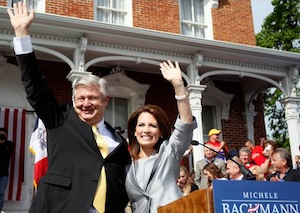 wed,
Michele Bachmann delivered a
dire warning to her fellow Minnesotans: The children of their
state were at risk. wed,
Michele Bachmann delivered a
dire warning to her fellow Minnesotans: The children of their
state were at risk.
“We will have immediate loss of
civil liberties for five million Minnesotans,”
Mrs. Bachmann, then a state senator, told a Christian television
network as thousands gathered on the steps of the Capitol
to rally for a same-sex marriage ban she proposed. “In
our public schools, whether they want to or not, they’ll
be forced to start teaching that same-sex marriage is equal,
that it is normal and that children should try it.”
Now that she is seeking the Republican
presidential nomination, Mrs.
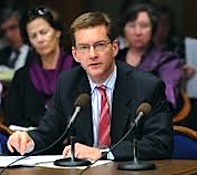 Bachmann,
a Minnesota congresswoman, is talking more about federal
spending than about gay rights. But her
political rise has its roots in her dogged pursuit of an amendment
to the State Constitution prohibiting same-sex marriage —
“her banner issue,” said Scott
Dibble, a Democratic state senator who is gay —
and her mixing of politics with her
evangelical faith. Bachmann,
a Minnesota congresswoman, is talking more about federal
spending than about gay rights. But her
political rise has its roots in her dogged pursuit of an amendment
to the State Constitution prohibiting same-sex marriage —
“her banner issue,” said Scott
Dibble, a Democratic state senator who is gay —
and her mixing of politics with her
evangelical faith.
Mrs. Bachmann’s strong stance on homosexuality —
she once likened it to “personal
bondage, personal despair and personal enslavement”
— and her anti-abortion views have appeal for some Republican
primary voters. In Iowa this month,
she delighted conservatives by signing a pledge opposing “any
redefinition of marriage.” (Her fellow
Minnesotan and presidential rival, Tim Pawlenty, a former
governor, was left explaining why he did not.)
Yet her position has also become
a distraction for her campaign. It has
exposed a longstanding rift between
the congresswoman and her stepsister, who is a lesbian.
It
has also raised questions about whether
her husband, Marcus, who runs two Christian counseling centers,
practices “reparative therapy,” or gay-to-straight
counseling, derided by critics as an effort to “pray
away the gay.”
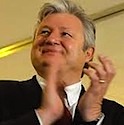 For
the Bachmanns, the issue is entwined with faith. “They
are absolutely not against the gays,” said one
close friend, JoAnne Hood, who also attends Eagle Brook. “They
are just not for marriage.” For
the Bachmanns, the issue is entwined with faith. “They
are absolutely not against the gays,” said one
close friend, JoAnne Hood, who also attends Eagle Brook. “They
are just not for marriage.”
“The threat she represented was
very real,” said Mr. Dibble,
who remembers Mrs. Bachmann “trotting
out junk science and debunked claims that being gay is a choice.”
During visitor tours of the empty Senate
chamber, he said, Mrs. Bachmann would bring people in “to
pray around my desk.”
 When
Out Front Minnesota, a gay rights group,
conducted lobbying days at the Statehouse, Mrs. Bachmann made
clear she was opposed to its agenda, which included legal
recognition of domestic partnerships and nondiscrimination
initiatives. Sometimes she would meet
gay constituents with guests of her own, said Monica
Meyer, the group’s executive director. “She
had ex-gay people,” Ms. Meyer said, “who
would tell her constituents that being gay was wrong and immoral.” When
Out Front Minnesota, a gay rights group,
conducted lobbying days at the Statehouse, Mrs. Bachmann made
clear she was opposed to its agenda, which included legal
recognition of domestic partnerships and nondiscrimination
initiatives. Sometimes she would meet
gay constituents with guests of her own, said Monica
Meyer, the group’s executive director. “She
had ex-gay people,” Ms. Meyer said, “who
would tell her constituents that being gay was wrong and immoral.”
But Christian conservatives embraced
it — and Mrs. Bachmann.
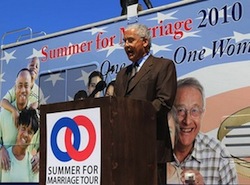 “She
stood up as a Christian,” said
Bob Battle, pastor of the Berean Church of God in Christ
here. “She made her point of view known, and she gave
Christians a voice.” “She
stood up as a Christian,” said
Bob Battle, pastor of the Berean Church of God in Christ
here. “She made her point of view known, and she gave
Christians a voice.”
“We’re seeing the fulfillment
of the Book of Judges here in our own time — every man
doing that which is right in his own eyes,” she
warned the hosts of one radio show, “Prophetic
Views Behind the News.” She went on: “They
aren’t interested in being Ward and June Cleaver, that’s
not what it’s about. They want legitimization, and they
want to force us to shut up about our opposition to the gay
lifestyle.”
|

MARCUS
BACHMANN
|
Christian
Counseling by Hopeful’s Spouse Prompts Questions
By SHERYL GAY STOLBERG
Published: July 16, 2011
LAKE ELMO, Minn. — The receptionists at Bachmann
& Associates, the Christian
  counseling
center run by the husband of the presidential hopeful
Michele Bachmann,
were polite but firm in turning a reporter away the other day.
A new sign was on the door. “Bachmann
& Associates,” it said, “prohibits
all soliciting, filming and photography in this building. NO
MEDIA.” counseling
center run by the husband of the presidential hopeful
Michele Bachmann,
were polite but firm in turning a reporter away the other day.
A new sign was on the door. “Bachmann
& Associates,” it said, “prohibits
all soliciting, filming and photography in this building. NO
MEDIA.”
The skittishness was not surprising. All week, Mrs. Bachmann
and her husband, Marcus, a therapist, had been caught in a swirl
of media attention over whether the clinic practices 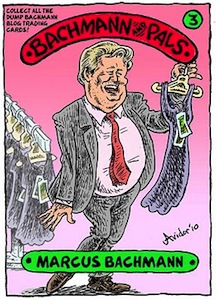 “reparative
therapy,” or so-called gay-to-straight
counseling. On Friday, in an interview published in The
Minneapolis Star-Tribune, Dr. Bachmann finally defended “reparative
therapy,” or so-called gay-to-straight
counseling. On Friday, in an interview published in The
Minneapolis Star-Tribune, Dr. Bachmann finally defended 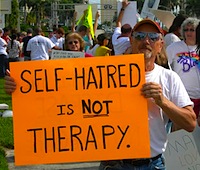 himself. himself.
“We don’t have an agenda or
a philosophy of trying to change someone,” he said, adding
that the clinic would offer reparative therapy only “at
the client’s discretion.”
That stance puts Dr. Bachmann at odds with most mainstream medical
associations; a 2007 task force put together
by the American Psychological Association
concluded that “efforts to
change sexual orientation are unlikely to be successful and
involve some risk of harm.”
But the American Association of Christian
Counselors, which has 50,000 members, supports
reparative therapy “on biblical,
ethical and legal grounds” for patients “with a
genuine desire to be set free of homosexual attractions,”
according to its code of ethics. The
goal is “heterosexual relations and 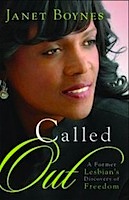 marriage
or lifelong sexual celibacy.” marriage
or lifelong sexual celibacy.”
Questions about whether Dr. Bachmann offers
reparative, or conversion, therapy have been percolating for
years, fueled partly by his friendship with Janet
Boynes (left), a Minneapolis minister who says she was “called
out of homosexuality” by God, and partly by his
argument that children are at risk when
parents and educators tolerate homosexuality.
In an interview on a Christian radio show last year, he said
young people must be discouraged from
acting on homosexual feelings, just as “barbarians
need to be educated.” (Dr. Bachmann says
the comment has been misconstrued to suggest he means gays are
barbaric. “That’s not my mind-set,” he told
The Star-Tribune.)
In June, Truth Wins
Out, a national nonprofit group dedicated to fighting
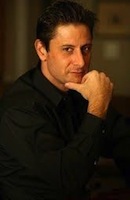  “anti-gay
religious extremism,” sought out people
who had undergone “ex-gay therapy”
at Dr. Bachmann’s clinic. One person, Andrew
Ramirez (below right), a 24-year-old manager for a lumber
company, responded that he “anti-gay
religious extremism,” sought out people
who had undergone “ex-gay therapy”
at Dr. Bachmann’s clinic. One person, Andrew
Ramirez (below right), a 24-year-old manager for a lumber
company, responded that he 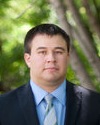 had. had.
Wayne Besen (left),
the founder of Truth Wins Out, said, “What
we found was reasonably professional with a skewed point of
view toward homosexuality being a negative and no offering of
hope that it is something positive.”
At Bachmann & Associates, which
advertises treatment for a range of problems —including
marital discord, anger management, addictions and spiritual
issues — the emphasis on faith is
strong. “Christ is the Almighty
counselor,” Dr. Bachmann says on the center’s
Web site. |
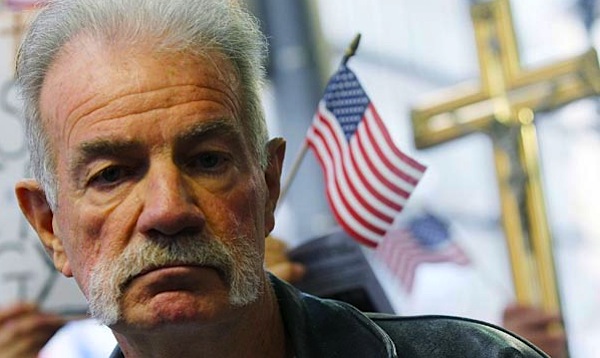
KORAN BURNER TERRY JONES
|
|

|
ROBERT
COANE 2011 © All rights reserved |
|

